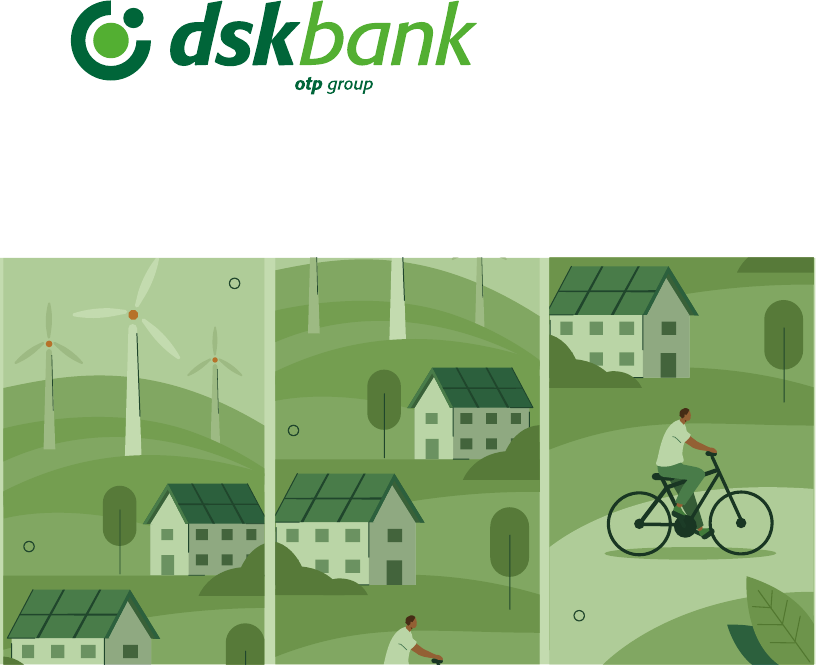
ЕNVIRONMENTAL
AND SOCIAL
RESPONSIBILITY
REPORT 2021
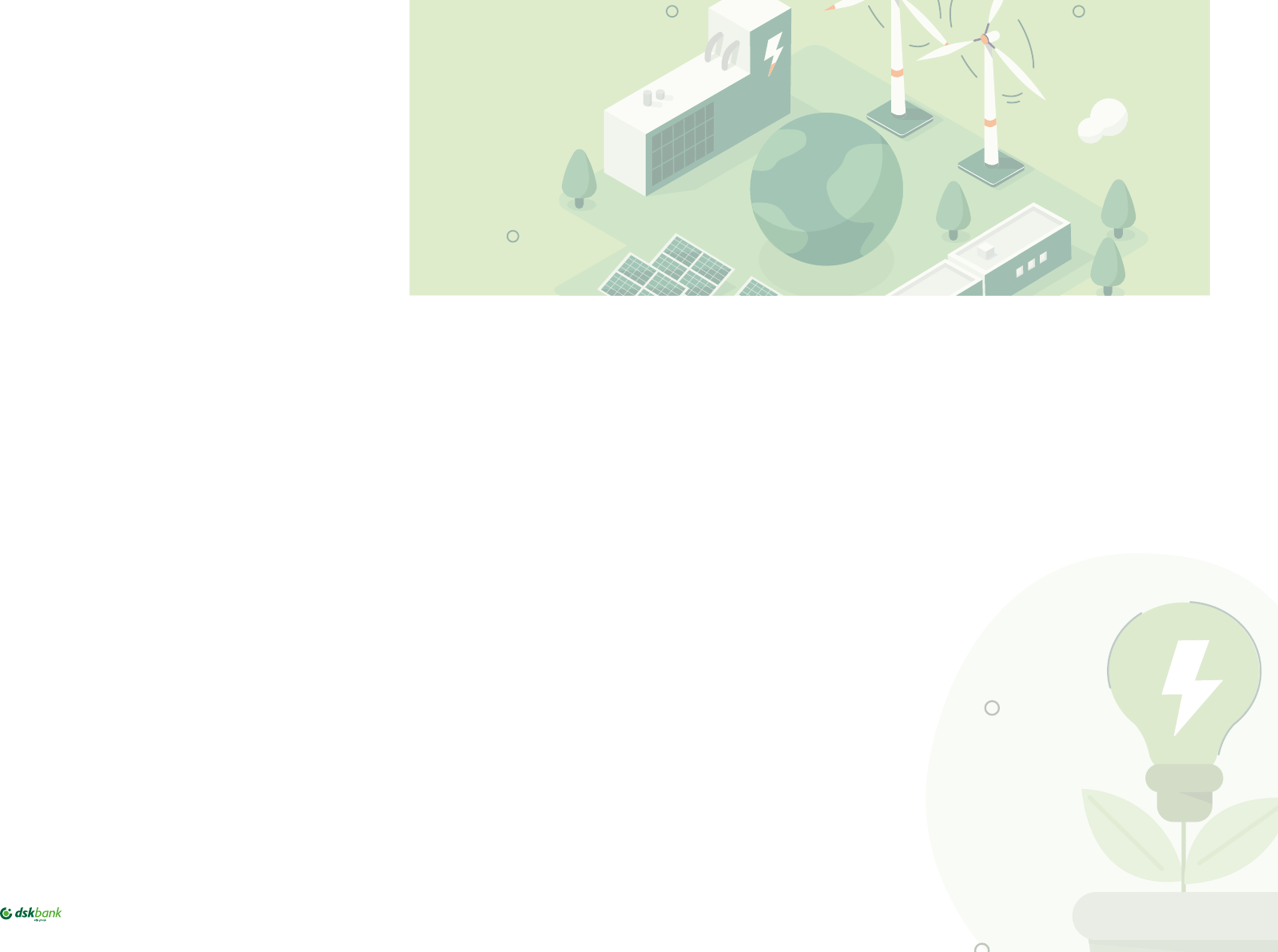
One of the key objectives of DSK Bank is to
become a market leader in regard to all banking
segments by establishing and maintaining high
client service standards, advanced and suitable
products and services, best corporate and ethic
practices in its relations with all interested
parties. We create key value for all our clients,
employees and shareholders by providing
appropriate solutions for their needs while
following the relevant legislation and ensuring
sustainable development.
In 2021, a strategic program for digitalization
has turned out to be a highly impactful
endeavor and undoubtedly has achieved its
ambitious purpose to even further improve
DSK Bank services and operations. During 2021,
there were sharp market trends to be observed
in digital activity in Bulgaria and DSK Bank was
among leaders in this aspect by introducing
important features. The main objective of DSK
Bank’s digital strategy is to provide modern and
high-quality online and mobile banking services
and offer wide range of online services, starting
from full E2E online onboarding of new-to-bank
clients.
The share of DSK Bank’s online and mobile
banking penetration is one of the highest in
the Bulgarian market, with faster growth of
the mobile banking usage. Recent data for
DSK Bank’s online banking - DSK Direct, show
that more than 1.3 million customers have
credentials to use it.
In 2021, the mobile app development was
focused on further improving the usability and
payments possibilities - improvement of utility
payments development of P2P payments to
mobile number, integration with Apple pay and
Google pay.
From 2022 onwards, DSK Bank will embark
on a new era of customer experience and
efficiency leadership. The Bank’s vision is to
build excellence through combining large-
scale digitization of customer journeys with a
revamped operating model.
In the beginning of 2022, we built a Digital
Factory to institutionalize the Bank’s operating
model at scale, resting on - customer-centric
service design, journey driven digitization,
agile way of working, developing talent and
capabilities of employees and technology
modernization.
Our engagements in the field of environmental
and social responsibility are manifested through
various initiatives and projects over time. By
doing so, we strive to incorporate environmental,
social and governance (ESG) considerations in
as many activities and processes as possible.
The concept of ESG is a way to achieve a future
that benefits all of us in the long-term. It is not
a single and stand-alone action, it is a long path
to go but the only possible and necessary one
to ensure economic development, greener and
more equitable place for generations to live.
INTRODUCTION
2
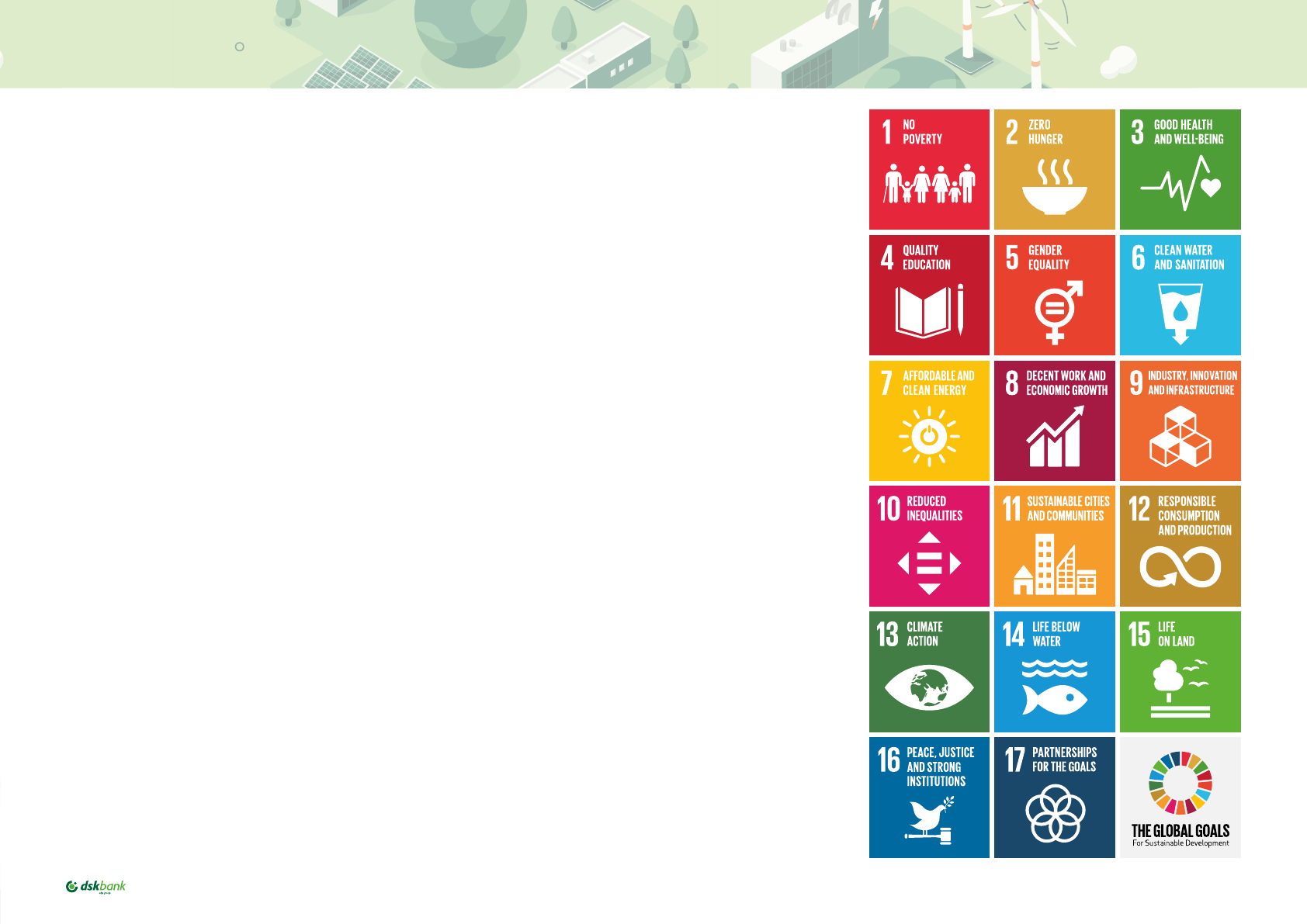
• by realizing the market opportunities with
a strong governance;
• by creating products and services to
support the transition plans of our customers
to low-carbon economy;
• by building strategies, policies and
systems to assess and manage the relevant
risks;
• by setting ambitious goals to our
institution aligned with the OTP Group ESG
Strategy;
• by monitoring results and regular
reporting on the progress achieved.
We strongly believe that every member of our
society can make an effort and contribute for
attaining a more sustainable world. The Bank
decided to publish this report apart from the
regulatory required disclosures as a fair and
transparent communication to all interested
stakeholders in order to emphasize the
importance of ESG topic and in particular – of
climate and environmental matters in terms of
their urgency. We use also the opportunity to
share our initiatives that took place meanwhile,
after the publication of 2021 Annual report.
For the first time we sought to associate
our actual activities with the Sustainability
Development Goals (SDGs), adopted by all UN
member states, by selecting those which we
think we have met at least to certain extent. This
selection can be further refined and harmonized
with our future plans after establishing the ESG
Strategy of DSK Bank Group with the relevant
targets.
How do we imagine the practical
application of this concept in DSK?
3

ESG stands for Environmental, Social, and Governance
but despite its frequent use in conversations, it is a
term that has no standard definition. Clearly, ESG
stands for applying non-financial factors in the
financial decision making process.
ESG can and should be defined as the corporate
contribution to the realisation of the United Nations
Sustainable Development Goals. There are 16+1 goals
in this framework with the ultimate goal that every
person on the Earth should live prosperous and fulfilling life in
peace and in harmony with nature, protecting the resources of
the planet for future generations.
There are three levers that make it imperative for businesses to
consider ESG factors carefully. The first is self-interest. In the words
of one of the worlds most powerful businessman „to prosper over
time, every company must not only deliver financial performance,
but also show how it makes a positive contribution to society”.
We want to prosper over time, however we can only do, what we
can do. What we can do, are financial services. With our products
we provide and more importantly, help our customers (Goal 17) to
provide good jobs and economic growth (Goal 8), we finance not
only affordable and clean energy (Goal 7), but industry, innovation
and infrastructure (Goal 9 and Goal 6). We guarantee access for
every Bulgarian citizen to high quality financial services, including
savings and pension products, which in turn is essential to fight
poverty (Goal 1) and enables sustainable communities (Goal 11).
The Urban Development Fund of DSK Bank invests into local
communities’ sports facilities, hospitals, museeums, educational
establishments (Goals 3 and 4).
The second lever is regulatory and market pressure. Commercial
banks, supervised by the European Central Bank are expected
to consider climate-related and environmental risks when
developing the institution’s overall business strategy, business
objectives and risk management framework, and to exercise
effective oversight of climate-related and environmental risks. In
practice we need to develop a system that not only to quantifies
but widely discloses our environmental credentials. In other
words, how our activities contribute to Goal 13, Climate Action. The
regulatory intention is to facilitate moral and market pressure.
This seems to work in Europe, where according to recent surveys,
attitudes towards the circular economy are extremely positive,
but Bulgarians are much less informed about it and apply it in
their daily lives.
The third lever is Corporate Social Responsibility. Our CSR program
is an effort to be socially accountable to ourself and the general
public, to help the communities we work in. “DSK Bank Helps”, is
focused on Children (Goals 1 and 4), on Nature (Goal 13), on Cities
(Goal 11) and volunteering (Goal 17).
Charlie Munger, another great investor said that he does not know
what the future of banking is. What he knows is „that a properly
run bank is a great contributor to civilization”.
To paraphrase him, properly governed banking system is a great
contributor towards the ultimate goal that every person on the
Earth should live prosperous and fulfilling life in peace and in
harmony with nature, protecting the resources of the planet for
future generations.
Tamas Hak-Kovacs, CEO of DSK Bank
Letter from the CEO
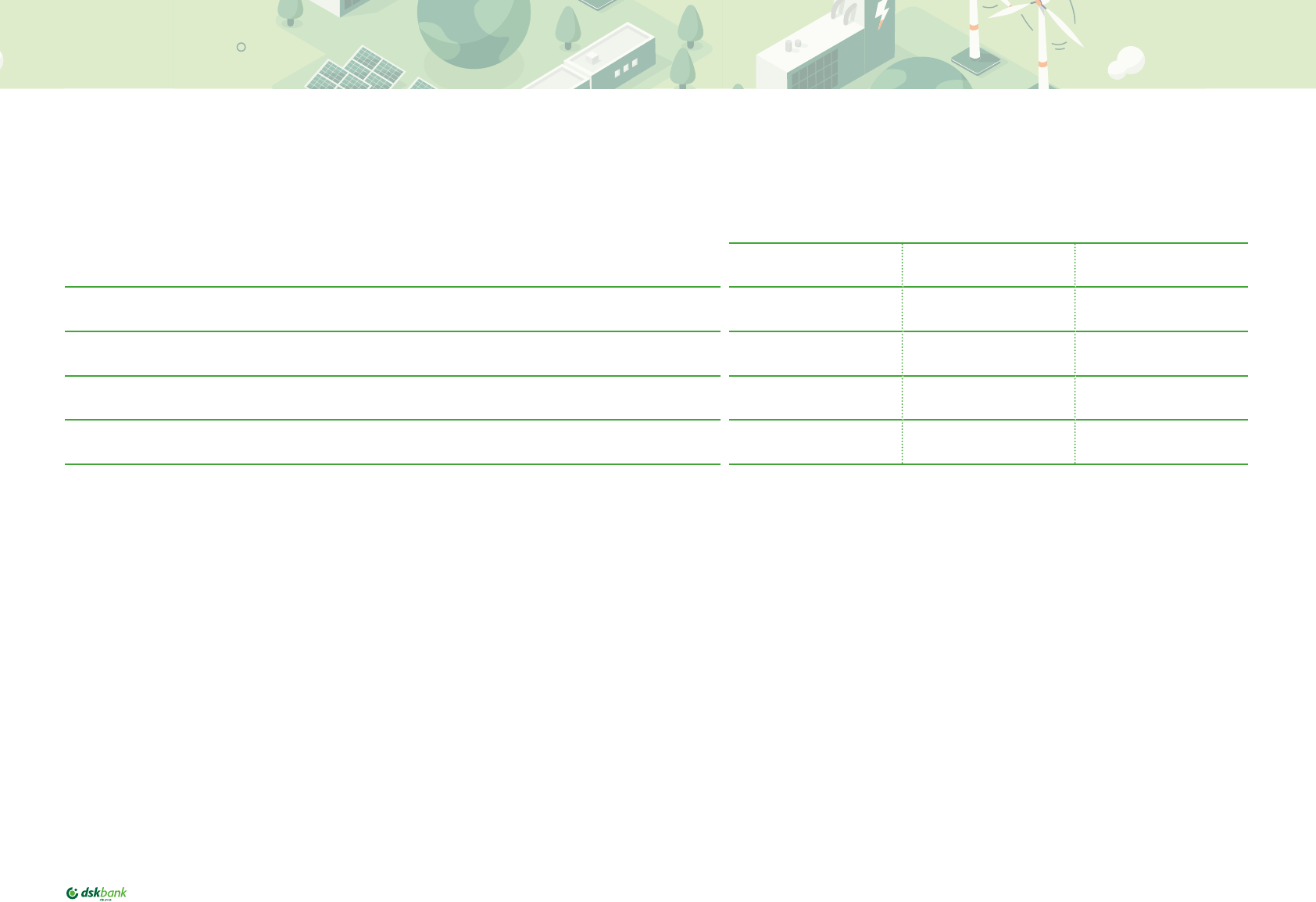
SUMMARY OF ESG ACHIEVEMENTS
2020 2021
Electricity consumption (GJ), DSK Group 88481 -6% 83092
Fuel consumption (liters), DSK Bank stand-alone 120510 -19% 97700
Total energy consumption per capita (GJ) 23,19 -13% 20,07
Scope 1 and Scope 2 CO2e emission (t) per capita 2,33 -17% 1,94
Volume of investment projects in RES powerplants financed (tsd EUR) 64781 +48% 96082
Currently, we finance ~20% of the total installed
wind and solar capacities (MW) in Bulgaria.
We prepared the first large-scale assessment
of carbon footprint of more than 200 corporate
customers in connection with our participation
in the first of its kind Climate Stress Test,
conducted by the ECB.
Project was launched in 2021 for installation
of photovoltaic plants on the roof of three
DSK Bank’s buildings that will reduce the CO
2
emissions by more than 125 tons.
Our new product Mastercard Wildlife Impact
Card, produced by 85,5% recycled and
recyclable material, won the Greenest Product
Award in the national competition “The
Greenest Companies in Bulgaria 2022”. For the
first three months since launching the sales,
more than 24 000 cards were issued.
Nearly BGN 1343000 were invested in
supporting cultural, urban development and
other social projects.
Over BGN 600000 were donated to SOS
Children Village through the DSK Bank’s ATM
system.
DSK Bank started its big and meaningful digital
transformation which includes new processes
and products, implementation of new systems
and working models that will greatly benefit
the customers. We were awarded by the Bank
of the Year Association for the best bank
digital project in 2021 – innovative solution
for contactless payment in the Sofia public
transport. The project combines innovation,
safety and carbon footprint reduction.
5
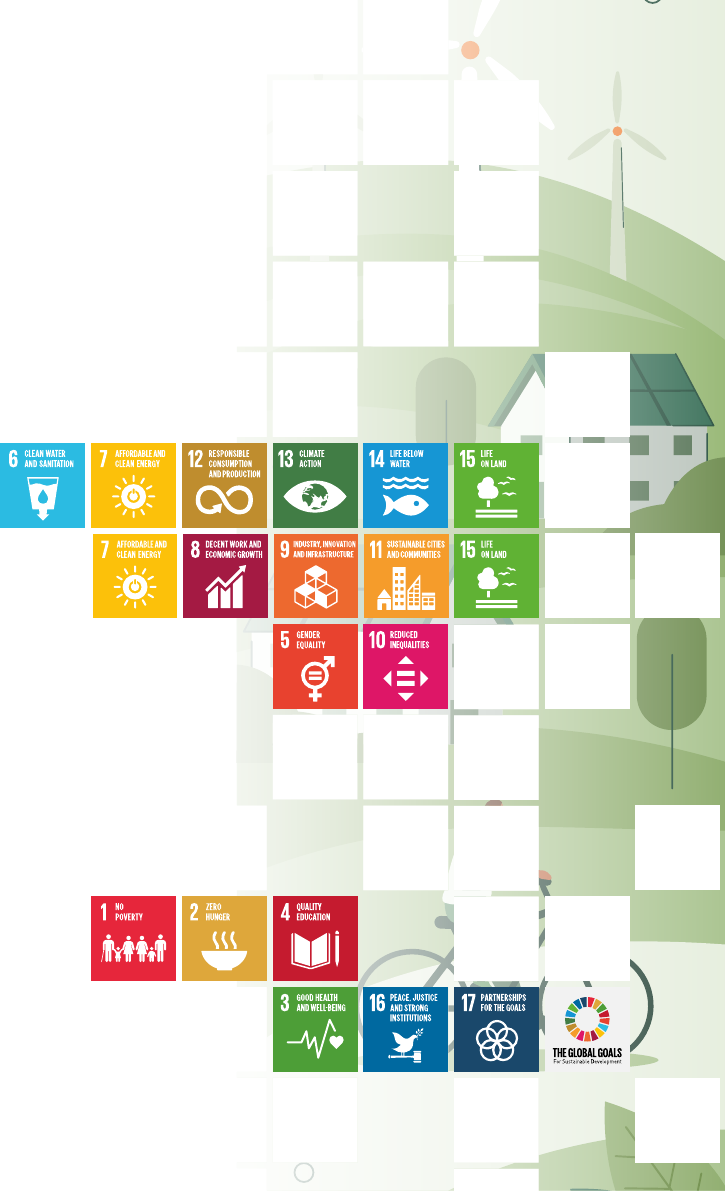
TABLE OF CONTENTS
INTRODUCTION AND STATEMENTS .................................. 2
SUMMARY OF ESG ACHIEVEMENTS ............................... 5
ESG GOVERNANCE ................................................................7
ENVIRONMENTAL CARE .................................................... 11
RESPONSIBLE FINANCING .................................................. 15
CORPORATE SOCIAL RESPONSIBILITY
THE CUSTOMER AT THE CENTER .................................... 19
RESPONSIBLE APPROACH TO EMPLOYEES .................. 23
RULES OF CONDUCT ............................................................ 25
SPONSORSHIP AND CHARITY ..........................................26
AWARDS .................................................................................28
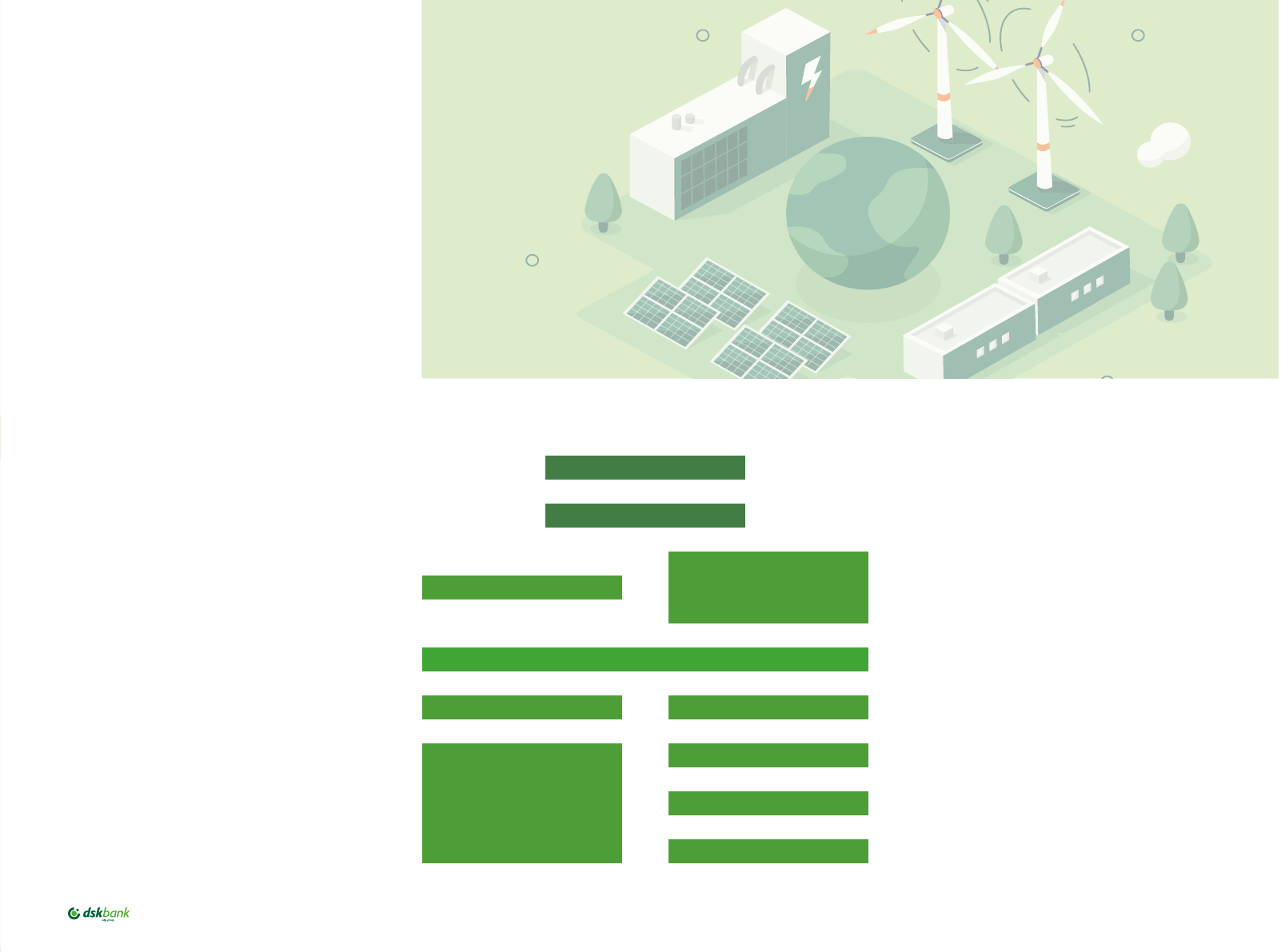
Organizational background
Given the increased regulatory
requirements and following the OTP
Group initiatives, in 2021 DSK Bank
has put focus on the climate and
environmental aspects of sustainable
development and has defined the
contribution to green transition by
applying ESG standards as one of
its major goals for the business year
2022.
ESG
GOVERNANCE
Steering Committee
Program Sponsor
UNITS INVOLVED IN THE WG UNITS INVOLVED IN THE WG
Stream 1: Regulatory expectation
Risk Management
Corporate banking
Retail banking
ALM
OPT Leasing
HR
Logisties
Finance
PR and Comunication
Stream 2: Own operation
Stream 3: Business opportunities
Subject Owners
Program Director
Svetoslav Salev
WORKING GROUP (WG)
Steering Committee: Key Governing body of the Program
Members:
Tamàs Hàk-Kovàcs (CEO)
Arnaud Leclair (CRO and Program Sponsor)
Boyan Stefov (Corporate Banking Head)
Gergely Pókos (OTP)
Tünde Barabàs (OTP)
Subject Owners: Responsible for the execution of the tasks and for
assuring respective resources.
Svetoslav Salev – Program Director and covering Business
environment, Business strategy, Management body and
organizational structure, Risk management framework,
Credit risk management;
Lyuba Doykova – covering Risk appetite, Reporting
operational risk management, Market risk management,
Liquidity risk management, Stress – testing;
Nevyana Filipova – covering Disclosures and DSK own
operations (Pillar 2).
Project Members:
Manage daily execution of the tasks. To be continuously updated until
project scope and exact tasks are finalized
7
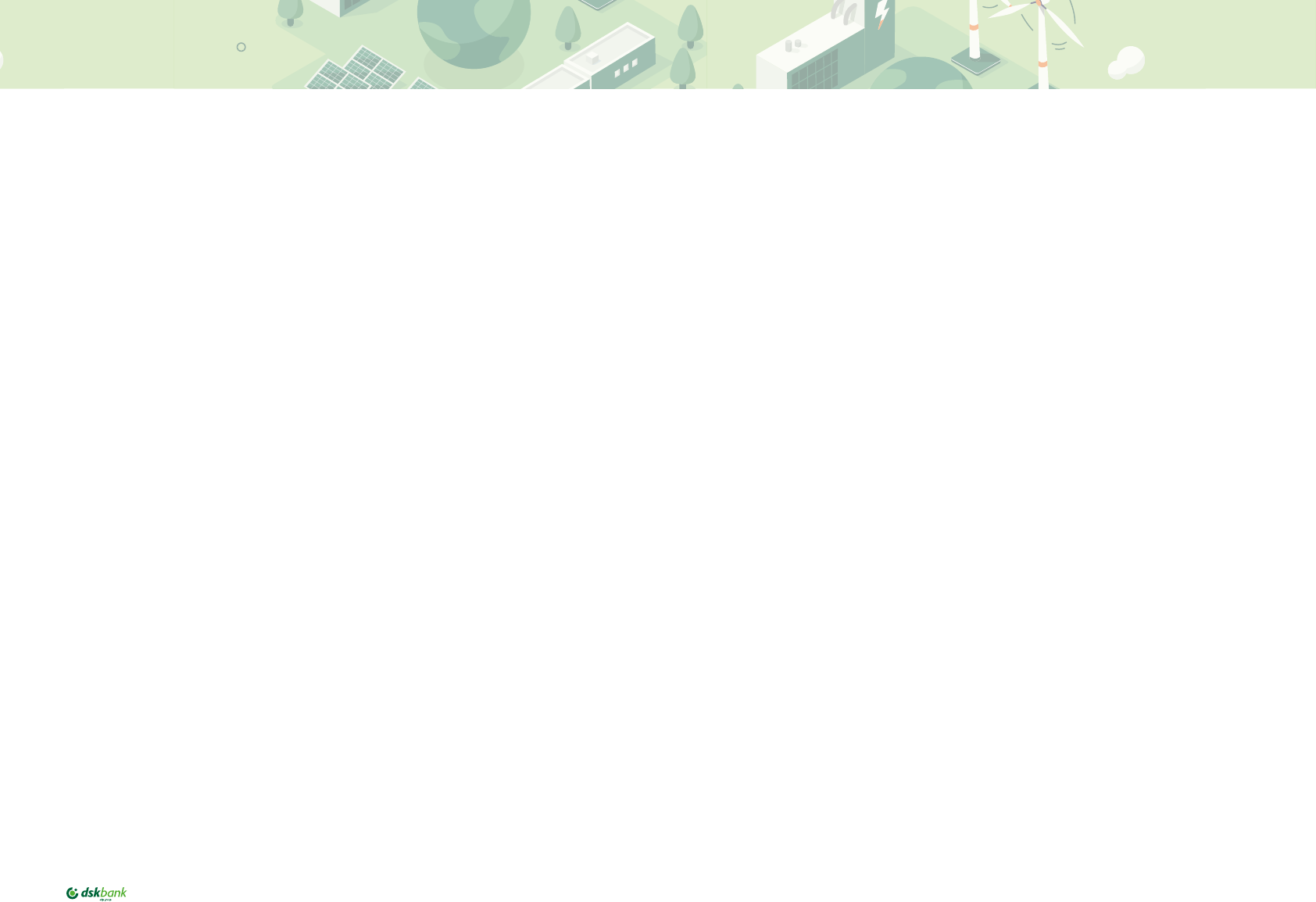
We started with an establishment of specially
dedicated to this topic project named ECO
in order to set the foundations of a systemic
management of climate and environmental
risks within DSK Bank’s Group and a proper
alignment with the objectives of OTP Group
to be the regional leader in financing a fair
and gradual transition to a low-carbon
economy and building a sustainable future
through responsible solutions. The main
goals of the project are to ensure the Bank’s
business sustainability in the time of climate
and environmental changes, and to develop
and implement ESG Strategy and practices
within the DSK Bank Group.
The project is structured in a way to
guarantee on one hand that the ESG topic
receives appropriate management focus and
attention from the highest decision-making
bodies while at the same time being broadly
integrated into all Bank’s operations.
Steering Committee is the key governing
body and the most important platform
for steering the Program. The Committee
regularly receives status reports to monitor
and evaluate the progress of the projected
tasks and to make decisions related to the
raised topics.
Project sponsor is the Bank’s Chief Risk Officer,
who is provided by the DSK Bank’s Management
Board with a mandate to lead the integration of
climate-risk management in DSK Bank Group,
in coordination with the OTP Green Program
Directorate and OTP Credit Approval and Risk
Management Division. Considering the potential
strategic impact of transition and/or physical
risks in the long term (as concluded from the
materiality assessment made in 2021), the Chief
Risk Officer is also mandated by the Management
Board to develop a proposal for the ESG Strategy
of DSK Bank Group by the end of the second
quarter of 2022.
Subject Owners form the core ESG team of the
Program. The members of the team are personally
assigned with responsibility for executing the
tasks in respective areas. The team performs
weekly meetings with the Sponsor and is in
contact with all relevant departments to ensure
the necessary resources and to support the
proper implementation of the relevant decisions.
The units involved in the project constitute
the Working Group. They are represented by
experts in different fields who manage the daily
execution of the tasks. These project members
can be continuously updated until project scope
and exact tasks are finalized.
In the context of its key role in implementation
of the overall business strategy and the risk
strategy of DSK Bank Group, Management
Board of the Bank oversees the climate-
related and environmental risks and bears the
primary responsibility for their managing. The
Board approves key policies, procedures and
methodologies relevant to climate-related and
environmental risks and decides on the major
actions to be taken with regard to them.
Qualitative performance criteria are determined
in 2022 targets of those Management Board’s
members who are assigned with direct
responsibilities for ensuring compliance with
the envisaged approach to climate-related and
environmental risks management.
In addition to the personal commitment
of the senior management, DSK Bank has
further enhanced the role and has engaged
the collective responsibility of different
committees within the Bank by embedding
the climate-related and environmental risks
and considerations into their agenda, incl.
committees to the Supervisory Board (Risk
Committee, Audit Committee, Remuneration
Committee).
8
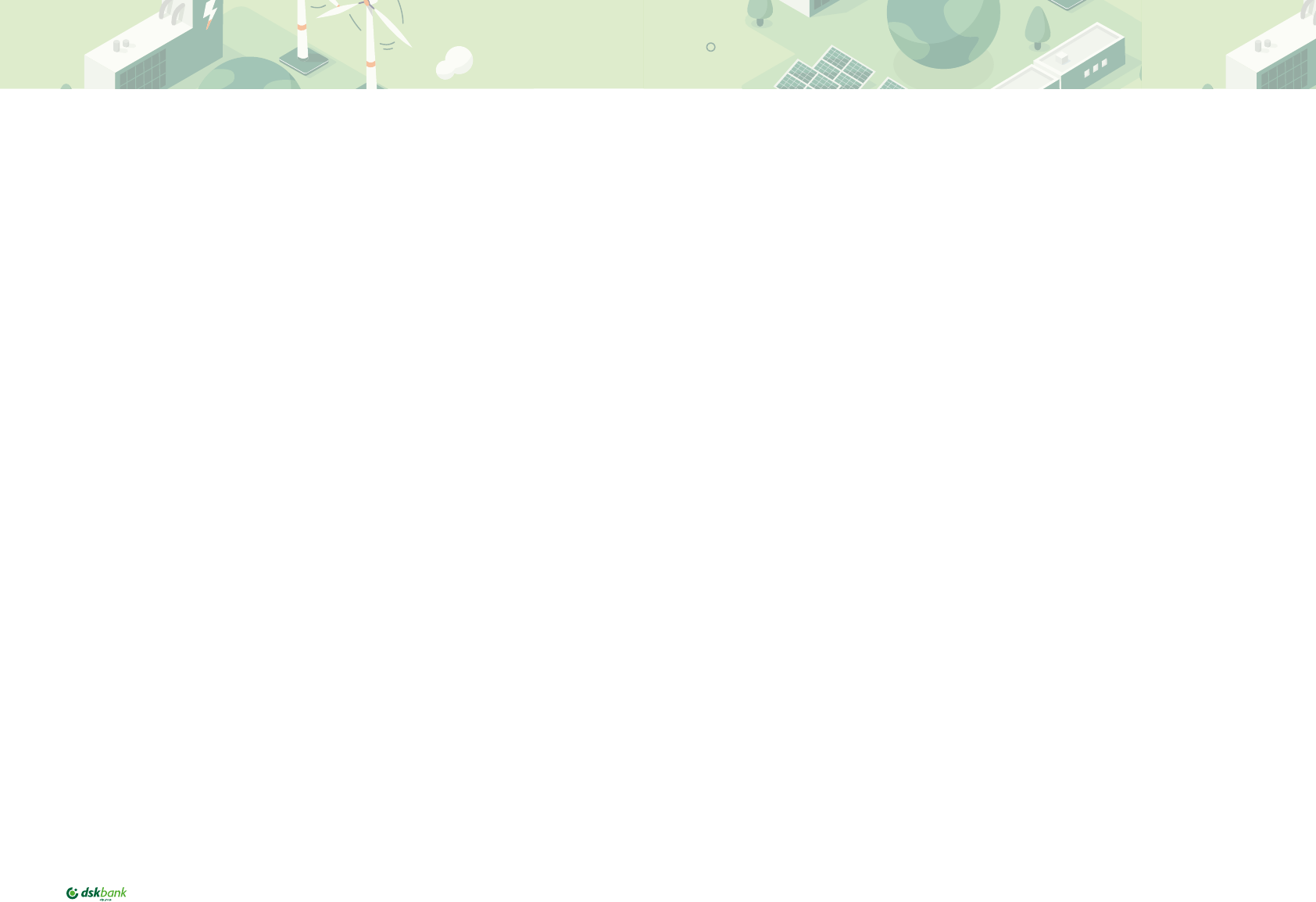
Practical aspects
The ECO project started in the last quarter of
2021. Following the preliminary assessment
of the regulatory requirements and market
conditions and after getting acquainted with
OTP Group ESG Strategy, the ECO project team
elaborated a Roadmap to address the ECB
guidelines. It represents detail project plan
structured around the thirteen supervisory
expectations - tasks to be executed within the
main areas defined, deadlines and responsible
persons/units. The proposed Roadmap was
approved by the Management Board of DSK
Bank Group which also requested to receive
quarterly updates on the progress.
The main focus of ECO project in 2021 was put on
the establishment of methodology to assess the
impact of climate related and environmental
risks on the Bank Group’s risk profile. Knowing
how exactly and to what extent the climate
changes can affect our revenue and sustainable
performance is a prerequisite for defining
concrete targets and appropriate mitigation
and adaptation measures. For the purpose
of this assessment climate-risk materiality is
defined as the sensitivity of traditional risk types
(credit risk, liquidity risk, operational risk.) and
related key risk indicators (KRIs) to the impact
of climate and environmental changes. KRIs are
derived from the Risk Appetite Framework of the
DSK Bank Group and are considered based on
their input components. Sensitivity is therefore
assessed at component level. To assess the
components’ sensitivity, the transmission
channels were considered for each of the
traditional risk types, split by climate transition
risk channels, climate physical risk channels
and environmental risk channels. Considering
the limitations of available data, the method
is based on expert assessment supported by
portfolio analytics (e.g. exposure by segments,
sectors, geographical distribution of collaterals,
etc.). With such quantification support experts
and senior managers assessed the sensitivity
of KRI components on a short-, mid-, and long
term, using Low to High scale, and documented
the articulated assessment rationale. Based
on these inputs, the method derives KRI level
and risk category level materiality assessment
on a 5-step scale from Low to High materiality.
Materiality level of Medium to High shows that
the impact of climate related and environmental
risks on the Bank Group’s risk profile is material
over the respective time horizon. This way
the outcome of the assessment leads to the
conclusion that DSK Bank’s Group is materially
exposed to climate related and environmental
risks in the long-term perspective (i.e. more
than 5 years). DSK Bank’s Management Board
reviewed and approved the elaborated
materiality assessment methodology.
Another important action initiated in 2021
was consultation with an external advisor
on a methodology to be used for measuring
and estimating Scope 3 financed emissions.
It is vital to determine the finance-triggered
emissions of the Bank not only because of the
forthcoming regulatory obligation to start
disclosing them but also because we assume
as our responsibility to support the customers
in reducing their Co2 emissions through the
financial solutions provided by the Bank. After
identifying the data gaps, methodology gaps,
etc. we will set up granular plan for measuring
carbon intensity by portfolios so that be able
to start disclosing our indirect impact through
Scope 3 financed emissions in alignment with
the regulatory requirements and the OTP Group
timelines.
9
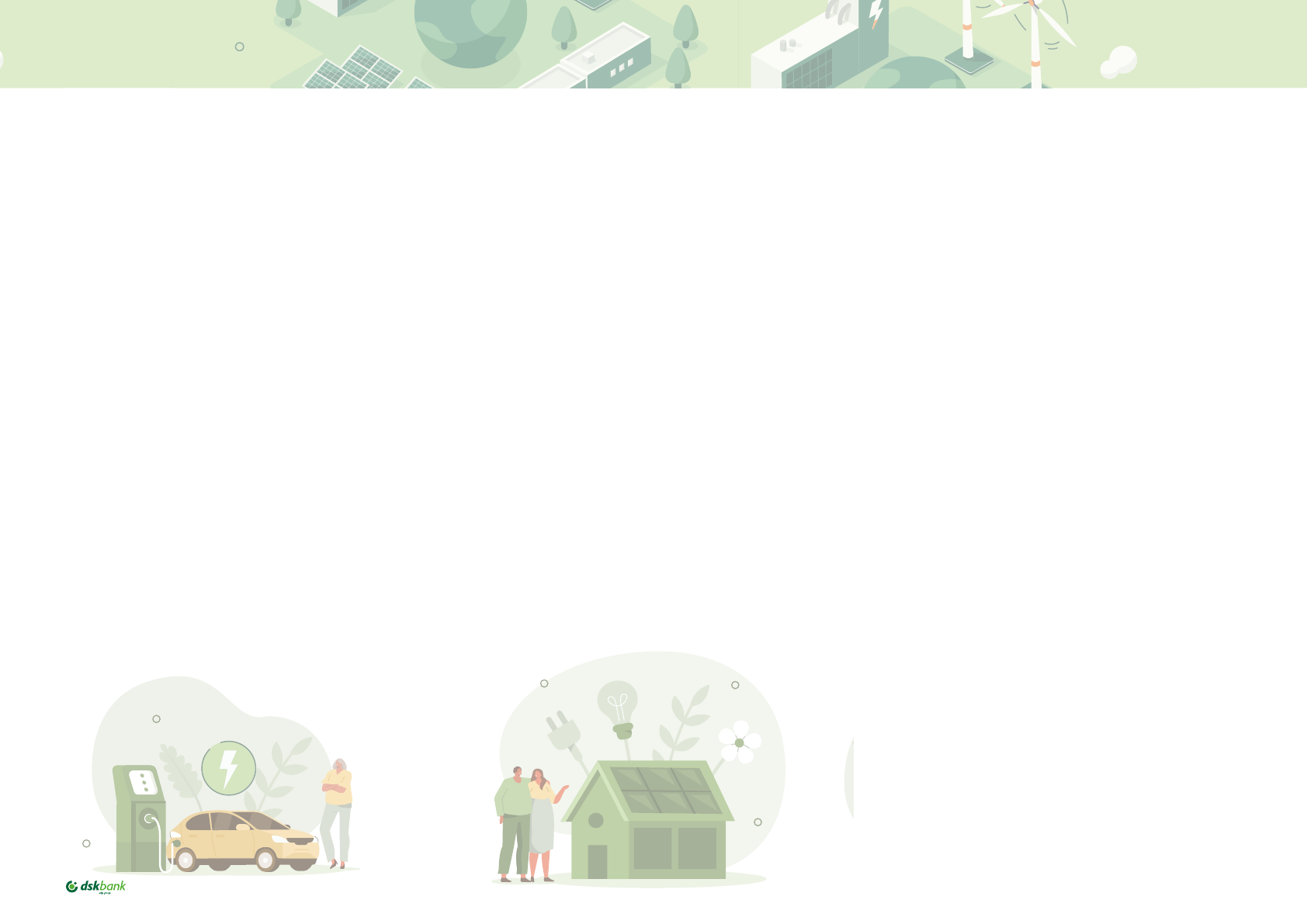
We respect the environmental regulatory and
supervisory requirements and disclose the
relevant information on the Non-financial
Declaration, part of our annual financial
statements. In particular, in view of the regulatory
requirements under Art.8 of Regulation (EU)
2020/852 on the establishment of a framework
to facilitate sustainable investment (Taxonomy
Regulation) that obliges all institutions which
publish non-financial information according
to Directive 2013/34/EU (NFRD) to report on
how and to what extent their activities are
associated with economic activities that qualify
as environmentally sustainable, for 2021 we
provided information related to the Taxonomy-
eligibility of activities of our customers and
other applicable indicators, together with
explanations on the methodology applied for
this assessment.
In accordance with the Regulation of the
European Parliament and of the Council on
sustainability-related disclosures in the financial
services sector (SFDR), in 2021 we disclosed
specific information about our approach to
the integration of sustainability risks and the
consideration of the principal adverse impacts
on sustainability in the investment decision-
making and investment advice processes. It
concerns the financial services provided by DSK
Group and can be found on the websites of DSK
Bank and its subsidiary DSK Asset Management
AD.
In 2022, DSK Bank took participation in the
first of a kind Climate Stress Test, carried out
by the European Central Bank. The exercise is
considered as a joint learning exercise with
pioneering characteristics. One of its main
objectives is to enhance the capacity of both
banks and supervisors to assess climate risk,
supervisory understanding of what climate-
relevant data banks have available and the
limitations when assessing climate-related
risks. The stress test covers three modules
focused on:
• overview of the institution’s internally
available stress testing capability and
capacity including its climate risk stress
testing framework, management and
modelling practices;
• two climate risk metrics, designed to shed
light on banks’ analytical and data capabilities
regarding climate risk. More specifically, the
metrics provide insights into the sensitivity
of banks’ income to transition risk, their
exposure to carbon-intensive industries and,
in that sense, the sustainability of the banks’
business model.
• bottom-up stress test projections,
targeting transition risk and physical risk.
Based on the developed methodology, DSK
calculated and declared the estimated Scope
1, Scope 2 and Scope 3 emissions of 236
counterparties.
We are currently preparing the ESG Strategy of
DSK Bank Group, expected to be implemented
in the second half of 2022. It will outline the
opportunities in financing climate change
mitigation and adaptation projects and will set
up relevant targets and commitments on our
road to achieve the goals defined by OTP Group
for reducing the carbon emissions.
10
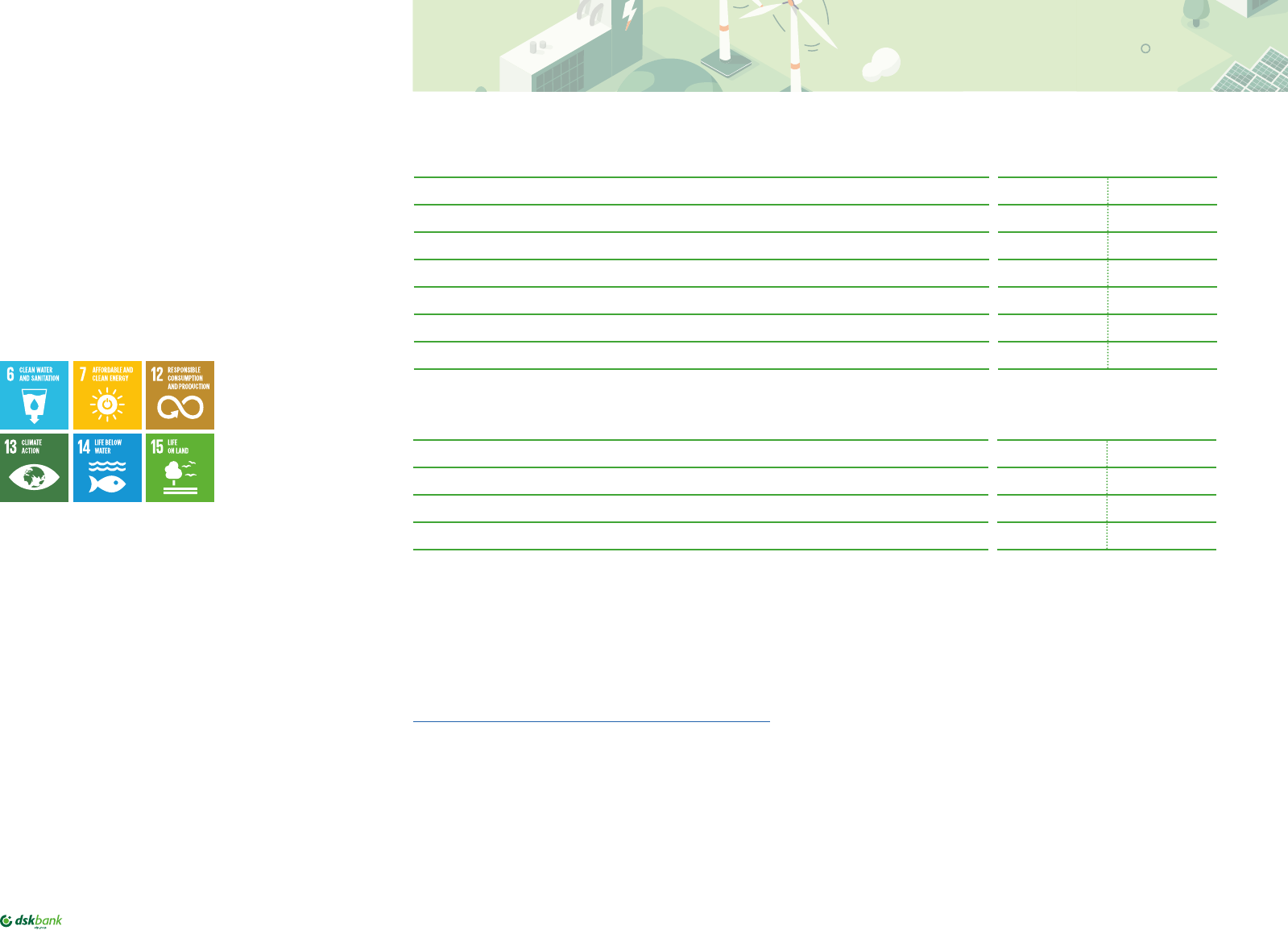
Energy consumption and GHG own emissions
OTP Group sets ambitious goals in terms of its
own operations, including the reduction of its
own emissions. The energy consumption data is
collected from all subsidiaries, incl. DSK Bank,
and available since 2016. Scope 1 and Scope
2 own emissions related to systems that are
within reasonable control of an entity, such as
onsite and purchased energy, are mandatory
part of OTP Group reporting process. The Group
uses GRI Standard and indicators for writing its
Sustainability report. The emission calculation
methodology is based on the GHG Protocol,
which is the best method currently used.
DSK Bank decided to start disclosing separately
its own GHG emissions from 2021, at DSK
Bank Group level. We published detailed
consumption and emission data on the Non-
Financial Declaration to our 2021 Annual report:
https://dskbank.bg/en/about-us/documents
The overall energy consumption has increased
by 7.6% compared to the previous year.
It is because we collected comprehensive
data from all subsidiaries of DSK Bank Group
and added it in the calculations for the first
time in 2021 (data for 2020 are on a stand-alone
basis). Energy consumption per capita has
decreased by more than 13%.
The most significant increase is observed in the
vehicles fuel consumption, resp. – fuel emissions
(Scope 1), which is due to one of our subsidiaries
with cash collection activity that requires the use
of a large fleet and frequent car trips. Actually,
the stand-alone fuel consumption of DSK Bank
has decreased from 120 510 liters for 2020 to
97700 liters for 2021.
ENVIRONMENTAL
CARE
Volume of energy consumption within the organisation (GJ) 2020 2021
Natural gas
3890 5441
Motor vehicles mineral
4861,87 19508,67
Motor vehicles biogen*
0,00 1158,41
Electricity
88480,80 83091,60
District heating
6830,00 2795,00
Total energy consumption
104062,67 111994,27
Total energy consumption per capita
23,19 20,07
* Motor vehicles biogen consumption collected separately since 2021
Scope 1 and Scope 2 CO2e emission (t) 2020 2021
Direct (Scope 1) 985,02 2088,22
Indirect (Scope 2), market-based 9470,46 8721,69
Total (Scope 1 + 2), market-based 10455,48 10809,91
Per capita, market-based 2,33 1,94
11
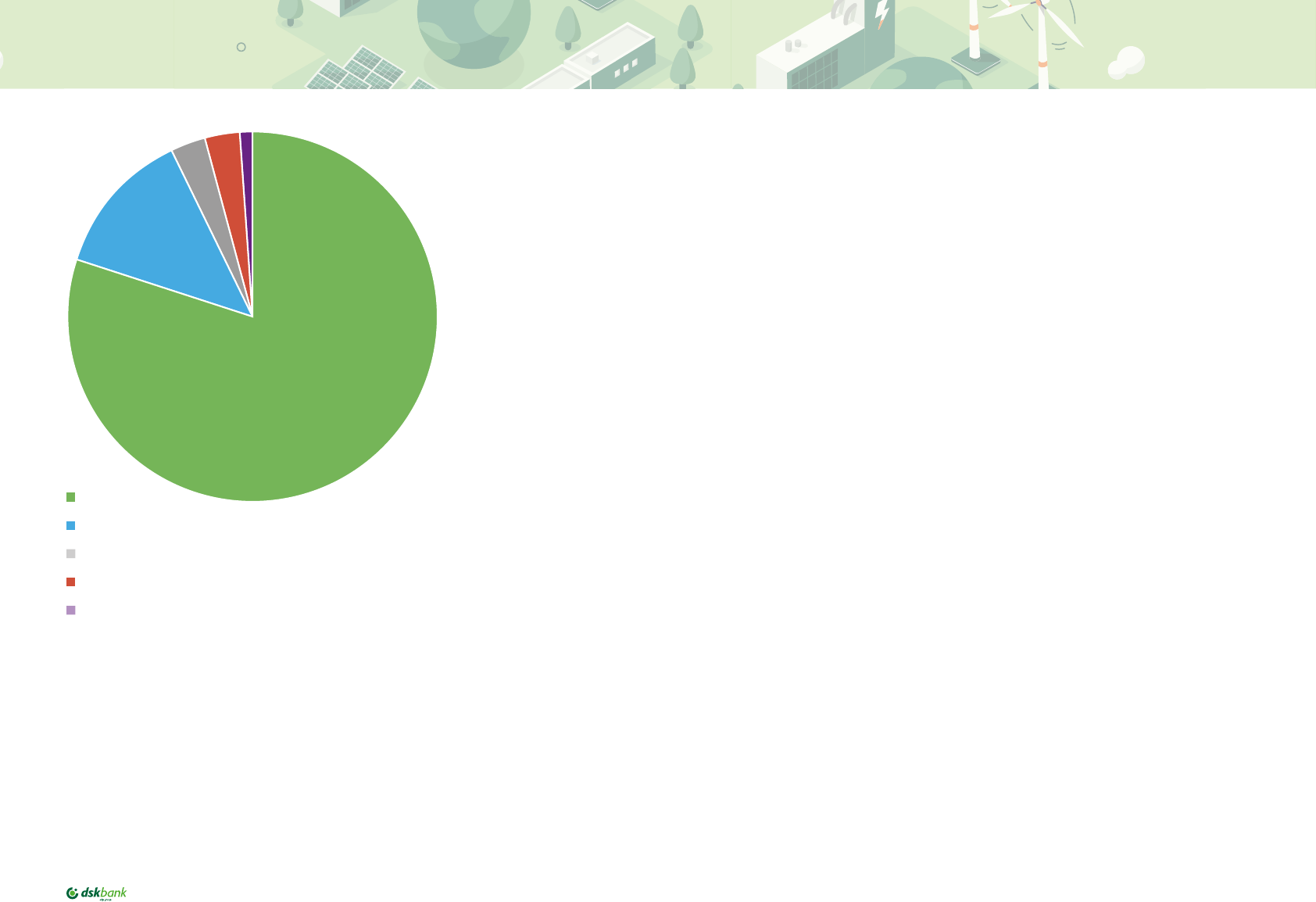
When buying new cars, the choice always
includes environmentally-friendly vehicles.
Currently, DSK Bank uses five electric cars for
company needs and has planned to purchase
another twelve hybrid cars by the end of 2022.
Electricity energy represents the largest part
of our consumption and the main focus of our
efforts for decreasing the own carbon footprint.
It has decreased by 6% in 2021 compared to 2020.
Along with the reduction of the number of bank
offices and work from home of employees due to
Covid-19 pandemic, this effect is due also to some
improvements made in our HQ buildings and
branch network offices, such as implementation
of simple Building Management Systems,
optimization of the Heating Ventilation and Air-
conditioning systems to work in a night mode
with low capacity, switching off the secondary
lighting, replacement of diesel heating systems
with energy-efficient air-conditioning systems,
partial replacement of depreciated air-
conditioning systems.
All renovated bank branch offices are
constructed in compliance with the vision
of the Banking group, using power-saving
facades, and the whole branch network uses
power-saving bulbs. The reconstruction of all
offices includes the use of energy-efficient and
contemporary heating, cooling, ventilation
and isolation systems and solutions, as well as
ecological materials and elements.
As a part of ongoing efforts to reduce our carbon
footprint, in November 2021 DSK Bank launched
a project for installation of photovoltaic plants
on the roof of three DSK Bank’s buildings in Sofia
and Stara Zagora. The project is expected to be
completed by the end of 2022, and the result
will be 125.1 tons less CO
2
emissions.
Technical specification was developed for
launching procedure for energy efficiency
audit. Initially, the audit is meant to cover part
of the largest buildings – three in Sofia, one in
Stara Zagora and one in Burgas. After the audit,
additional actions will be defined based on the
conclusions – repairs, replacement of windows,
lights. The final output will be improved energy
efficiency.
To draw the attention of employees and to
provoke their commitment to the issue, in May
2022 internal campaign “Green week” took
place as a step for reducing our carbon footprint
on the environment and to limit the global
warming. It was dedicated to the responsible
energy consumption and passed by sharing
information about the Bank‘s commitment to
sustainable development and the Green Deal,
interesting facts about energy and carbon
emissions and good practices for prudent
energy use or ideas on how to reduce energy
consumption in the Bank. An internal challenge
was set to reduce the electricity used in the Bank
‚s premises by 5% compared to 2021. Electricity
consumption data by buildings and branches
will be shared on a quarterly basis during the
whole 2022 and in early 2023 the unit with the
highest contribution and the winners of the
challenge will be announced.
Electricity 80%
Fuel of company cars 13%
Air-conditioning 3%
NAtural gas 3%
District Heating 1%
12
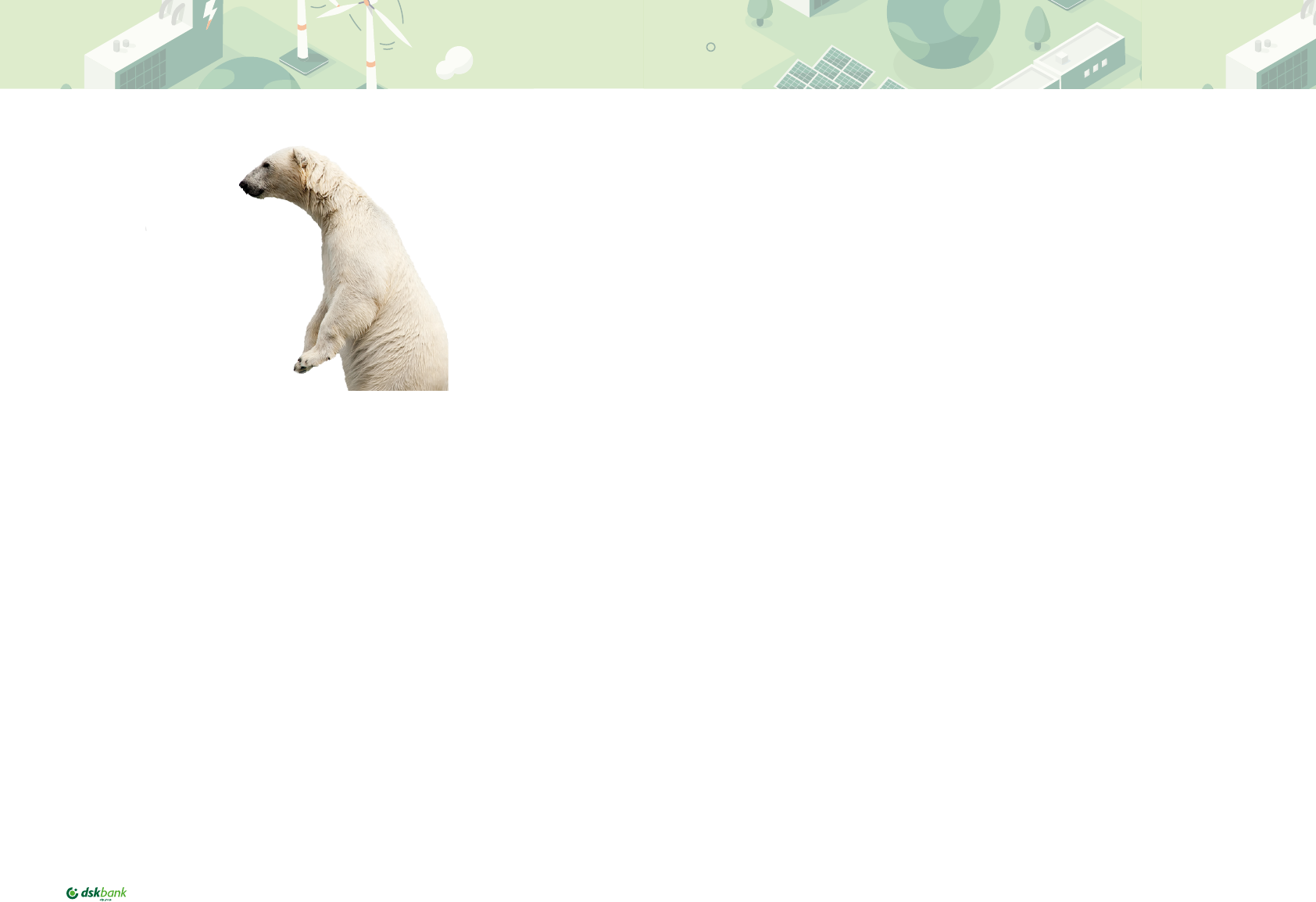
We also collect and monitor data on the
business trips of the employees (that affect
Scope 3 indirect emissions related to our own
operations), incl. number of airplane trips,
company use of own cars (km), taxi use (km).
Although the data for 2021 include those of
DSK Bank’s subsidiaries (which was not the case
for 2020), we observe significant decrease of
kilometers travelled – by 25% of the company
use of own cars and by 52% of the taxi use. It
is partly due to the measures related to the
pandemic and partly due to business reasons
- use of online meetings, which has become
common practice in our Group due to hybrid
work.
In order to stimulate commuting of our
employees by more environmentally friendly
transport, in 2021 we created new bicycle
storage spaces at two Bank’s locations in Sofia.
Other environmental initiatives
We have a tradition of raising awareness and
taking joint action to protect environmental and
natural resources. In 2021, we supported several
environmental initiatives and encouraged the
environmentally conscious behaviour of our
employees.
The purpose of DSK Bank is to mitigate its
negative impact on the environment. For years
now, the Bank fulfils the policy for no-waste
banking administration, which main goal is
protection of the environment. In practice, this
includes collection of all used toners and inkjet
cartridges of the printing devices in all Bank
branches and their recycling. The Bank applies
also a policy of responsible paper consumption
by optimizing the printing activities through
migration of transactions to the electronic
channels, double-sided printing, reducing the
number of pages of the contract General Terms
and Conditions for the products.
DSK Bank operates selective waste collection
at its sites in Sofia and Varna and has expanded
the selective collection of paper waste during
the year – 52 t paper and 30 kg PET bottles waste
collected separately in 2021.
For several years the Bank has created
organization for voluntary collection by the
employees of plastic caps and their disposal for
recycling. On 17
th
April 2022 we donated 500 kg
of plastic caps collected by the teams in our HQ
buildings in Sofia. This activity unites the care
for the nature and the support for noble causes
– the plastic caps are delivered for recycling at
the designated points and the amount collected
is spent for different charity initiatives.
Knowing that more than 360 million tons
of plastic products are produced worldwide
and that 90% of the waste in the oceans is
plastic, in the beginning of 2022 we launched
a new initiative to introduce eco-practices in
our offices by minimizing the use of plastic
products in the workplace. As a first step, we
urged our employees to replace the plastic cups
with a bottle or reusable cup. Several quick
changes were also made - all disposable cups
were removed from the water machines in the
Bank’s HQ buildings, glass cups were provided
for the needs of external visitors during business
meetings, etc.
“In DSK Bank 80 % of C0
2
emissions are created from the
usage of electricity and 13% from
motor vehicles. Reduce your carbon
mark and don’t waste energy.
Our future is in your hands.”
13
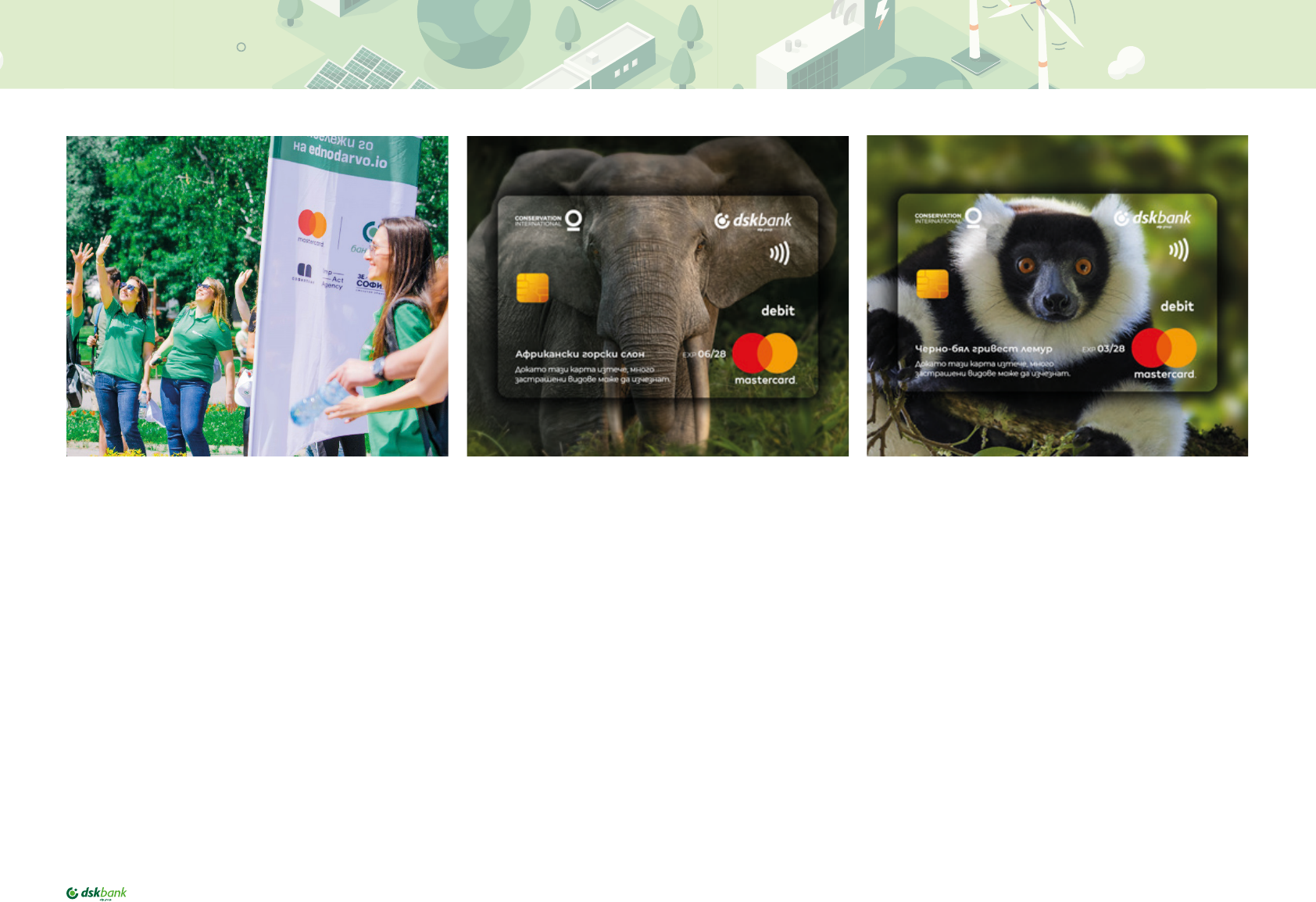
In 2021, together with Mastercard, the Bank
supported the OneTree project. The initiative
includes series of events in various parts of
Sofia, that marked the beginning of the creation
of a digital map of Sofia’s trees. Marking the
city trees on the streets and park alleys in Sofia
was easy through all kinds of mobile devices at
ednodarvo.io. With this project, OneTree drew the
attention of all citizens to take care of the trees
in the city by participating in their mapping - an
important step for smarter city management,
which aims to increase general knowledge
about the green system and contribute for its
better planning and management. The events
for the project were 5 in total, starting on May
15
th
from Borisova Garden and ending on June
12
th
in Lagera Park. Within one month, more
than 380 volunteers took part in mapping over
12,226 trees.
At the end of 2021, DSK Bank joined the global
Mastercard Wildlife Impact Card program for
preservation of the planet’s biodiversity. Thanks
to the efforts of the Bank and Mastercard,
Bulgaria became the first European market
to join the Program. It will allow debit card
holders to become involved in the conservation
of critically endangered species, including the
African elephant, the black-and-white maned
lemur, the yellow-tailed woolly monkey and
the pangolin. The vision of the debit card
draws attention to the message: “Until this
card expires, many endangered species may
become extinct.” The debit card can be easily
integrated into mobile wallets, and the physical
card is made from recycled materials. For
each Mastercard Wildlife Impact card issued,
DSK Bank and Mastercard will donate $ 1 to
Conservation International to help conserve and
restore wildlife habitats. By 2030, this project
will cover priority areas of 40 million hectares of
land and 4.5 million square kilometers of water
worldwide.
Customers have the opportunity to join the
program by ordering their new card since the
beginning of April 2022.
14
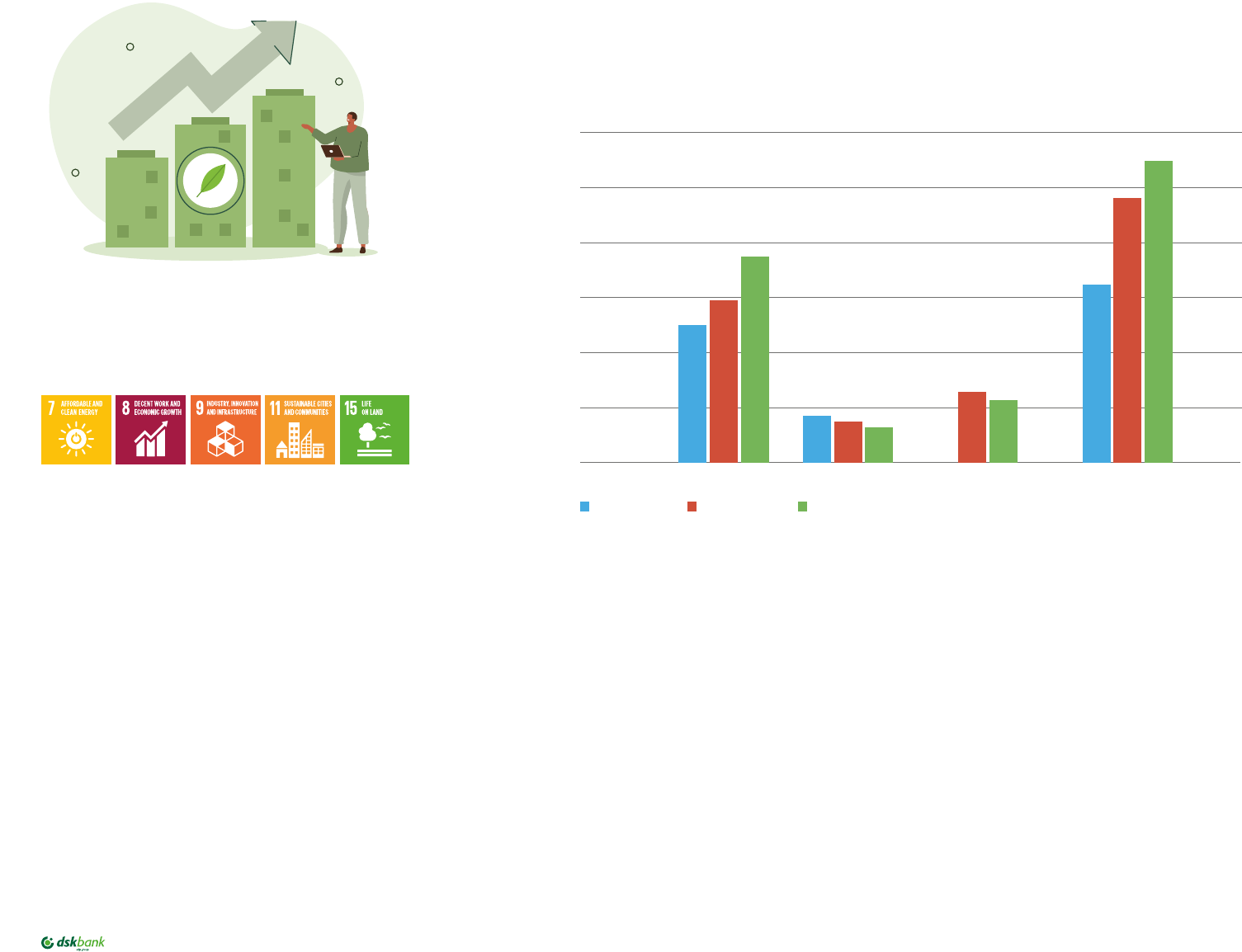
Financial solutions with positive environmental
impact
Understanding banks’ role in the changing
climate and business environment, we in DSK
Bank are aspired to provide fair and sustainable
services to our clients.
Following the road to a low-carbon economy, we
continue our financial support of investments
in renewable energy sources powerplants. Our
portfolio volume follows increasing trend, which
is additionally accelerated by the increased
demand for green energy as presented below.
On 29 June 2021, DSK Bank and OTP Bank closed
a deal with the fifth largest existing wind farm
in Bulgaria, thus increasing our exposure in
renewables It consists of two sites – Shabla and
Kamen bryag. In total, there are 14 Vesta wind
turbines with V90 power and every one of them
has a capacity of 3 MW. The produced green
energy in the windfarm will mainly be used
locally in Kavarna region. This efficient source of
energy accumulated by the power of the wind
is only of the alternatives to fossil fuels and
it contributes to the reducing of greenhouse
gas emissions, diversifying energy supplies
and reducing of dependence on unreliable and
volatile fossil fuel markets, especially oil and
gas.
We finance not only large powerplants, but
also small projects of our clients in the Small
business segment – either for commercial
purposes or for meeting their own electricity
needs. By financing significant share of solar
and wind investments in Bulgaria, we are well
positioned on the market.
RESPONSIBLE
FINANCING
*Project finance and corporate clients only
0
20000
40000
60000
80000
100000
120000
Exposure in RES powerplants in thousand EUR
Solar Water Wind Total
31.12.2020 31.12.2021 31.03.2022
15
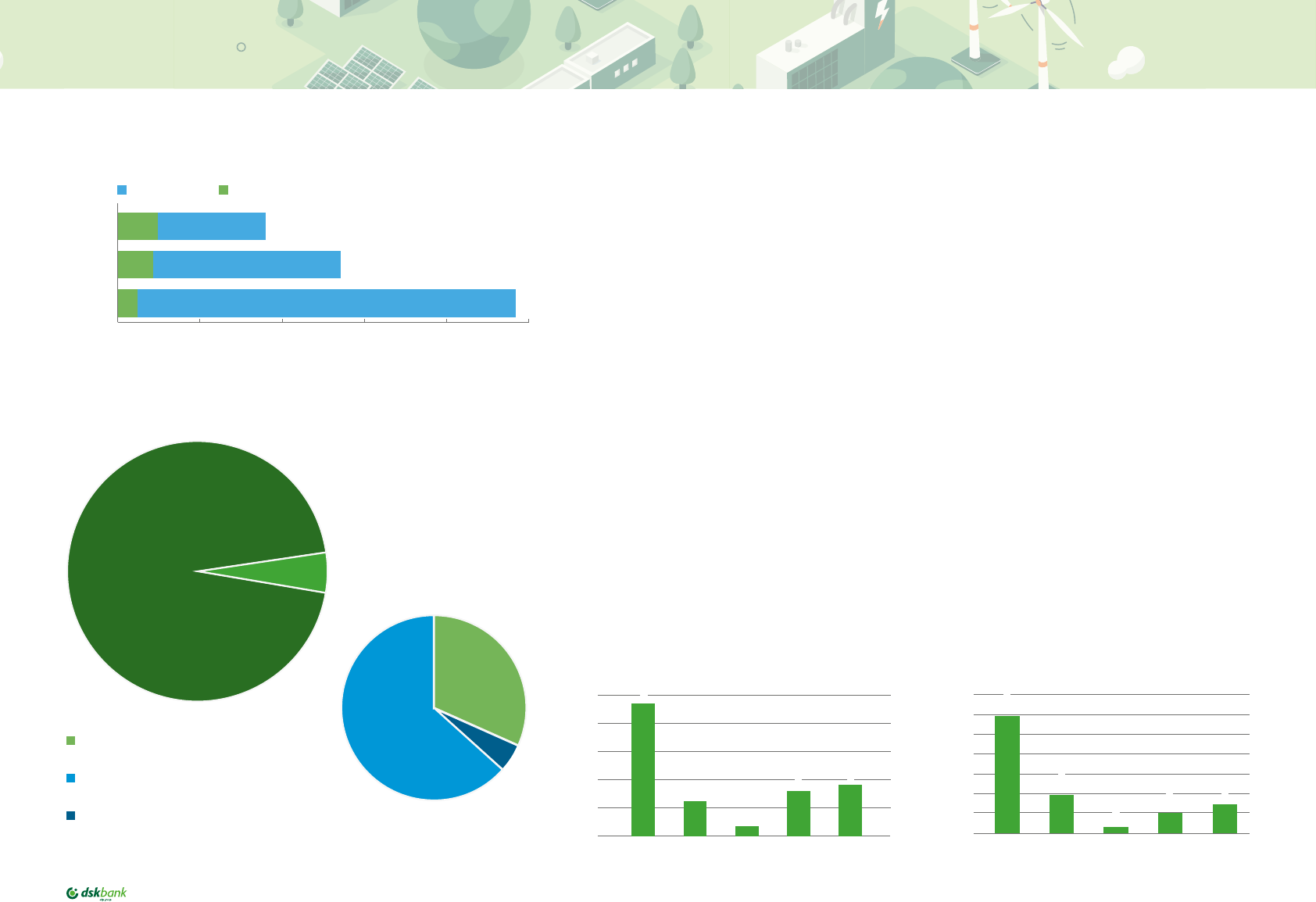
Relatively small share in hydro
powerplants is due to the huge capacity
installed back in time (30+ years) by
the state authorities. In addition, the
utilization of these hydro PPs’ capacity
nowadays is 25-40%.
Bulgaria is still at the beginning of
its transition period, especially in the
transportation industry. Lack of charging
infrastructure and higher price compared
to fossil fuel engines are the main reasons
for the lower pace of changing vehicle
park. Only 5% (or 28,73 million EUR) of
total OTP Leasing’s portfolio of 574,68
million EUR represent electric and CNG/
LNG assets. However, we are focused on
development of a green leasing product
which should lead to increasing number
of requests for single purchase or fleet
financing of electric vehicles.
We are collaborating with major EU
financing institutions such as EBRD and
European Investment Fund, and Bulgarian
authorities. Under EIF’s and Bulgarian
government schemes we support the
most vulnerable entities on the market –
micro and SMEs credit.
As COSME scheme was introduced in the
midst of the corona-virus pandemic, its
resource was almost depleted by the end
of 2020. In 2021, we continued mainly
with JEREMIE guarantee, followed by
implementation of EGF scheme in late
2021. Bulgarian government, through state
owned Bulgarian Development Bank and
Fund Manager of Financial Instruments in
Bulgaria, provided additional guarantee
schemes for support SMEs liquidity and
recovery.
500 1000 1500 2000 2500
234673
1192166
702198
EIF JEREMIE EIF EGF EIF COSME
EIF JEREMIE EIF EGF EIF COSME
*As of 31.12.2021
*As of 31.12.2021
Renewable Installed Capacity, MW
Leasing Portfolio
Contracts signed in 2021 Contracted amount, thousand EUR
Total MW Dsk MW
Wind
Solar
Hydro*
Total Portfolio 1
Electric and
CNG assets – 0,05021394
CNG trucks and busses – 0,035054332
Electric locomotives – 0,13986501
Electric vehicles – 0,00117056
0
100
200
300
400
500
0
10000
20000
30000
40000
50000
60000
70000
BDB –
Recovery
BDB –
Recovery
FMFIB –
COVID19
FMFIB –
COVID19
63000
469
20500
126
10850
160
15520
183
3600
37
16
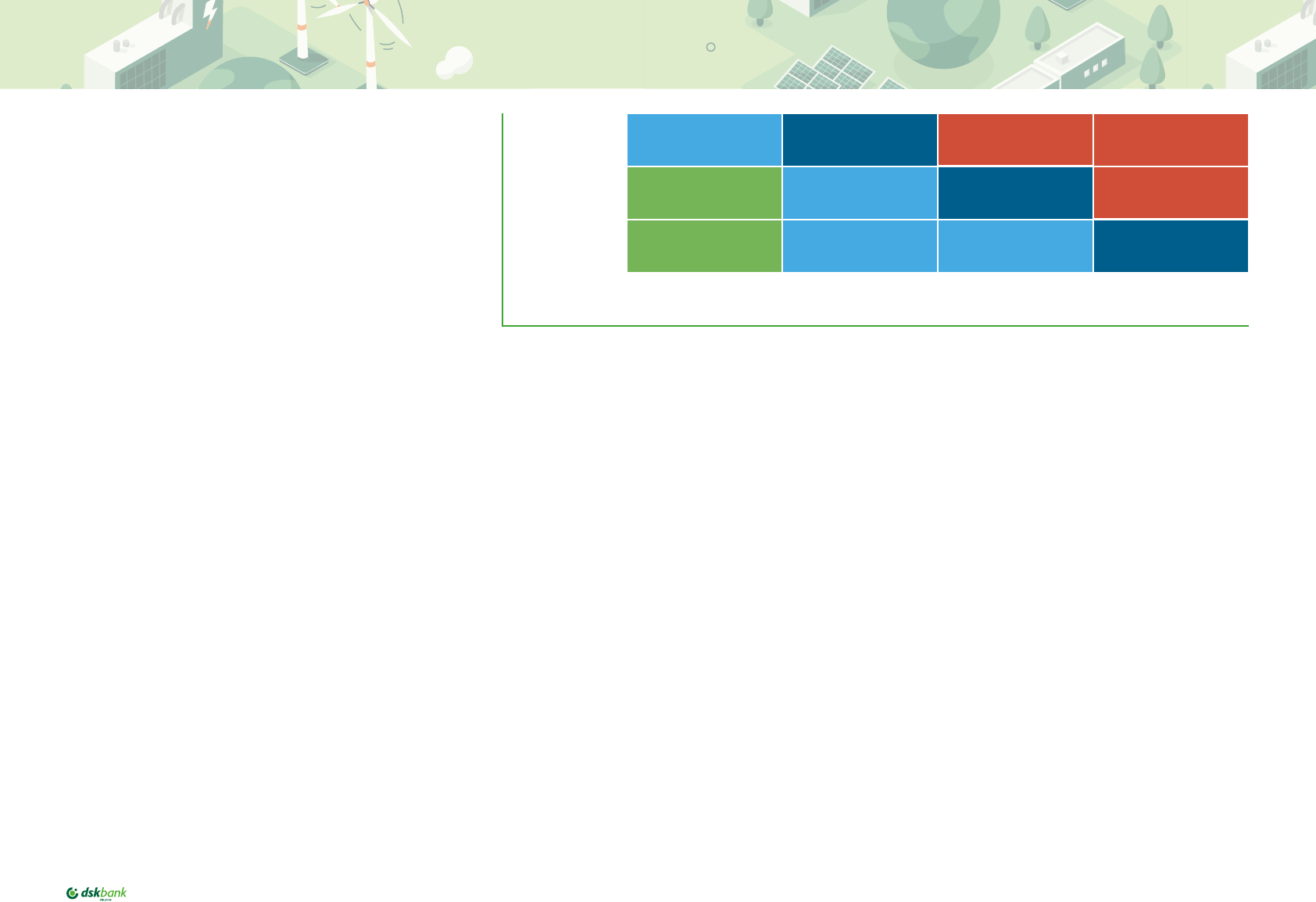
ESG risk management in the lending
Apart of renewable energy sources powerplants
financing, we assess our entire business
portfolio in line with ESG, as we understand
that managing ESG-related risks is key factor
in the credit process. Implemented in 2021,
the ESG Risk Management Framework in Loan
Origination and Monitoring of DSK Bank Group
(hereinafter: The Framework) describes roles
and responsibilities in the credit process for DSK
Bank and its leasing subsidiary OTP Leasing.
Under the Framework we apply an ESG Exclusion
List that lists activities and behaviors whose
controversial nature and impact make them
incompatible with OTP and DSK Bank Group’s
values for safeguarding human rights and
promoting sustainable development.
Based on established methodology, applied in
European banks and authorities, which considers
environmental and social factors, as well as
sector specific physical and transition risks, we
defined our own industry based ESG Risk Heat
Map. It categorizes industries in four ESG Risk
Categories, representing different risk levels:
Low, Medium, Medium-high and High ESG risk.
ESG risk category of the clients is determined
by using the Sectoral ESG Risk Heat Map,
where the business sector of the client’s main
business activity is the driver of the ESG risk
categorization.
ESG risk category of the transaction is
determined by considering two factors – the ESG
category of the client as mentioned above, and
the length of the transaction (residual in case of
existing exposure). The length of the transaction
is determined as
• Short-term: residual maturity is equal
to or less than 1 year (including the expired
transactions or transactions with no fixed
maturity, i.e. “until further notice”);
• Medium-term: residual maturity is more
than 1 year, but equal to or less than 5 years;
• Long-term: residual maturity is more than
5 years.
By applying the matrix above the final ESG risk
category of the transaction is set:
For large tickets falling in medium-high or high
category we apply ESG questionnaire for overall
assessment of the client based on its readiness
and activity in ESG. If the score is positive, ESG
risk category of the deal could be improved by
1 notch.
FMFIB –
COVID19
Length of transaction
Long Medium Medium - High High High
Medium Low Medium Medium - High High
Short Low Medium Medium Medium - High
Low Medium Medium - High High
Sectoral/client ESG risk category
17
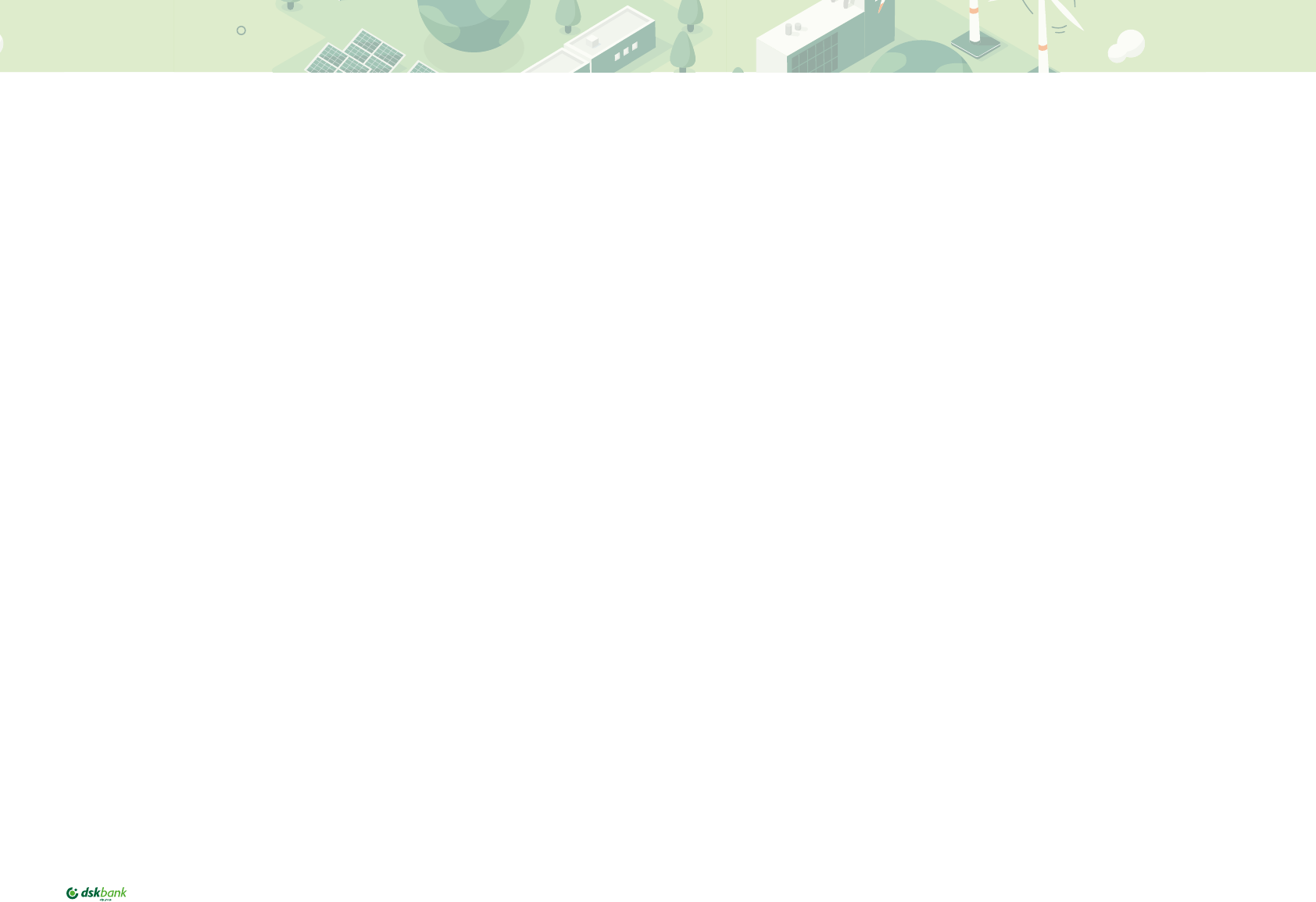
Support of cultural and urban
development projects
Last year the Bank also contributed to the
development of local projects for cultural and
urban development. The strategic goal of these
projects is to preserve the traditions and culture,
as well as to attract more visitors and also to
use the potential and advantages of city more
hospitably and effectively.
Together with the Regional Urban Development
Fund, DSK Bank co-financed a project for
modernization of community center “Bratya
Grancharovi-2002” in Gorna Oryahovitsa. The
building of National Community Center “Bratya
Grancharovi-2002”, as well as the largest open
stage in the region - the Summer Theater with a
capacity of over 2,000 people, will be renovated
at the initiative of the Municipality of Gorna
Oryahovitsa cultural center with an area of 3,975
sq.m.
The Tutrakan Epic Memorial Complex will also be
built thanks to funding from DSK Bank and the
Regional Urban Development Fund. The complex
will be built on the land of the village of Shumentsi
in Tutrakan Municipality. The emblematic
location is recognized as a historical cultural
value with a category of “national significance”
in 2018. The project envisages the construction
of an energy efficient (energy independent)
exhibition building with futuristic design and
modern interactive equipment and furniture. The
building will be located on an area of about 800
square meters and will include a main exhibition
hall, diorama, space for commercial activities
and technical premises. The project will improve
the area around the memorial and the building,
as well as create a green recreation area.
In 2021, started the renovations of the multimedia
visitor center “Tsarevgrad Tarnov” and the
museum “Revival and Constituent Assembly” in
Veliko Tarnovo. Within the project “Expansion of
Multimedia Visitor Center” Tsarevgrad Tarnov “
will be expanded the existing center, also known
as the” Museum of Silicone Figures “, using 2
more floors of the same building located on
street” Nikola Piccolo “№ 6, Veliko Tarnovo. The
implementation of the project will enrich the
collection of figures recreating commemorative
events from the period of the Second Bulgarian
Kingdom, thus increasing the impact of the
proposed tourist attraction - unique in nature.
Among the new scenes that will be recreated in the
form of dioramas are “The Battle of Klokotnitsa”
from 1230, “The Four Gospels of Ivan Alexander”,
the so-called “Medieval Market”, as well as a
number of other interesting reconstructions. It is
expected that the renovation activities will start
in early 2022 and end in early 2023.
DSK Bank together with the Regional Urban
Development Fund grants under OP “Regions
in Growth” 2014 – 2020” and the Municipality
of Vratsa co-financed the renovations of the
Regional Library “Hristo Botev” in Vratsa.
Established in 1954, the Regional Library is an
icon image of Vratsa – it shows the soul of the
city and it stands for the city’s prosperity and
development. The building is located in the
center of the city, on one of the most attractive
shopping streets – Petropavlovska Str. The
renovations will improve the energy efficiency
and contribute to the interior environment
making it more comfortable for the readers. As a
result, the building will acquire a renovated and
welcoming look.
Last year started the renovation of the organ hall
in Dobrich with investment of over 2 million leva.
The funding is provided by the Regional Urban
Development Fund, DSK Bank and grants under
OP “Regions in Growth” 2014 – 2020”. The project
is a part of the Integrated plan for reconstruction
and development of the Municipality of Dobrich.
It will provide the renovation of “Dobrich” hall – a
visual hall with 534 seats and the corresponding
lobbies, dressing rooms, rehearsal, work
and service premises in order to encourage
participation in the cultural life of the citizens.
The hall is an important cultural and historical
hub for the community. In the implementation
of the project the construction and repair work
will be carried out in order to adopt efficiency
measures and to improve the access to the hall
for people with disabilities.
18

CORPORATE SOCIAL RESPONSIBILITY
Our social approach includes various initiatives and projects directed to, in particular, the most
numerous groups of stakeholders of the Bank, i.e. clients and employees. Our social activities and
support to other groups of the society are described in the following chapter.
THE CLIENT AT THE CENTER
Digitalization and innovation
By digitalizing the existing core products and
services in a customer-centric way, following a
journey-by-journey approach with the objective
of creating market leading and loveable digital
solutions, we strive to save clients’ time and
money, and also to protect the environmental
resources.
Following its strategy for digitalization, in 2022
DSK Bank has opened its Digital Factory. The
new unit will be a technology company within
the company, which will focus its activities on
creating digital products and personal solutions
for the clients of the largest bank in the country.
The Digital factory is the place where will be
created products and new customer experiences.
There the products will be developed not only by
employees from the Bank, but also by partners,
even by the customers themselves. With this
factory the Bank will completely change the way
the products are created so that in time DSK
Bank become as good as fintech companies.
One innovative solution is the opportunity
to apply for consumer loan with individual
conditions entirely online. The process can be
completed in less than 5 minutes without need
to visit a bank office.
Another innovative solution is an online virtual
POS application form. Online payments are made
24/7 on the e-shop through the virtual POS. DSK
Bank allows traders to apply and receive prior
approval, even if they are not customers of the
Bank. By integrating with public registers, the
form takes 2 minutes to complete.
In addition to the existing products, two new,
all-digital processes will be presented to
customers in the middle of 2022.
The first is onboarding for business clients -
a completely online process for registering
business clients, without an analogue on the
market, which saves time. The advantages
are that no visit to a bank office and paper
documents are required, and the signing is
done through an electronic signature for all
documentation. The Bank’s experts expect the
whole process to take no more than 20 minutes.
The second innovation is BizCredit - an online
application for business credit overdraft. With
this service, the Bank’s business customers
can receive financing in a few easy steps, again
entirely online. The advantages are that there
is no fee for examining a loan application, no
additional documents are required and clients
can perform the process from the comfort of
their own office.
19
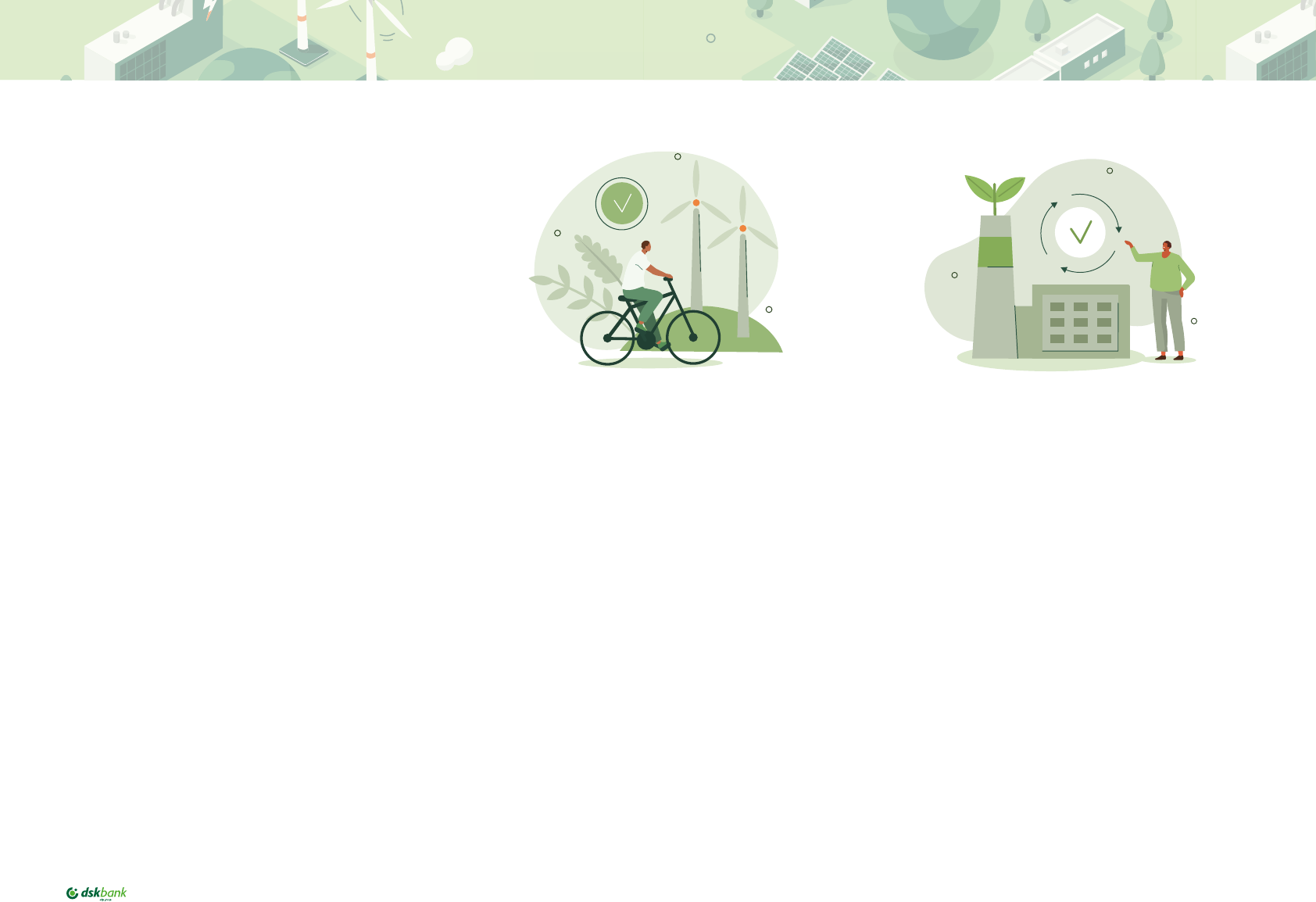
Signature pads
From the beginning of 2022 DSK Bank
implemented new signature pads in its entire
branch network. The functionality covers
the writing of 33 types of basic documents
- contracts and additional agreements to
current or savings account agreements, time
deposit annexes, general terms and conditions,
declarations, package contracts, internet
banking and two cash transactions - installment
and withdrawal. This new way of working is liked
by both employees and customers because it is
considered more modern, convenient, without
printing paper and saves the effort of scanning
paper. Customers like it too - they are committed
to signing a one-page consent document and
putting 10 signatures on the device itself.
Mortgage loan client journey and value
proposition
In line with its efforts to be innovative and to
increase the quality of customer journey of clients
who are searching for a real estate property,
in 2021 DSK Bank launched a new platform
www.dskhome.bg, which is the backbone of a
new housing ecosystem. The platform www.
dskhome.bg enables customers to find offers
for real estate properties according to their
personal preferences with wider information for
the area and the profitability of the property in
case it will be rented out.
Game changing service for Sofia public transport
One of the Bank’s objective is to develop and
implement smart solutions and innovative
projects aimed at improving the urban
environment and increasing the penetration of
cashless payments.
Jointly with its subsidiary DSK Mobile, in 2021
DSK Bank introduced an innovative solution
that completely transformed the service for
purchasing transport documents in the public
transport in Sofia. Passengers who use buses,
trolleybuses, trams and Sofia metro no longer
need to carry small amounts of cash or buy
a ticket before using the transport. They can
directly use their debit or credit cards, or mobile
NFC wallets. It is enough just to tap them on
validators only when boarding the vehicle.
Financial education
During 2021, DSK Bank kept its educational
campaign “Calm on the Internet”, dedicated
to raising consumer awareness of safe banking
and safe use of the Internet. The campaign again
was aimed not only at the bank’s customers, but
also at all those who use online financial and
other services. The purpose of the initiative is
to present in a simple and understandable way
the main highlights of safe online banking and
Internet browsing. As a socially responsible and
engaged institution, DSK Bank has a mission to
provide knowledge to consumers so that they
are at ease while using electronic channels
for banking or other services in an online
environment.
20
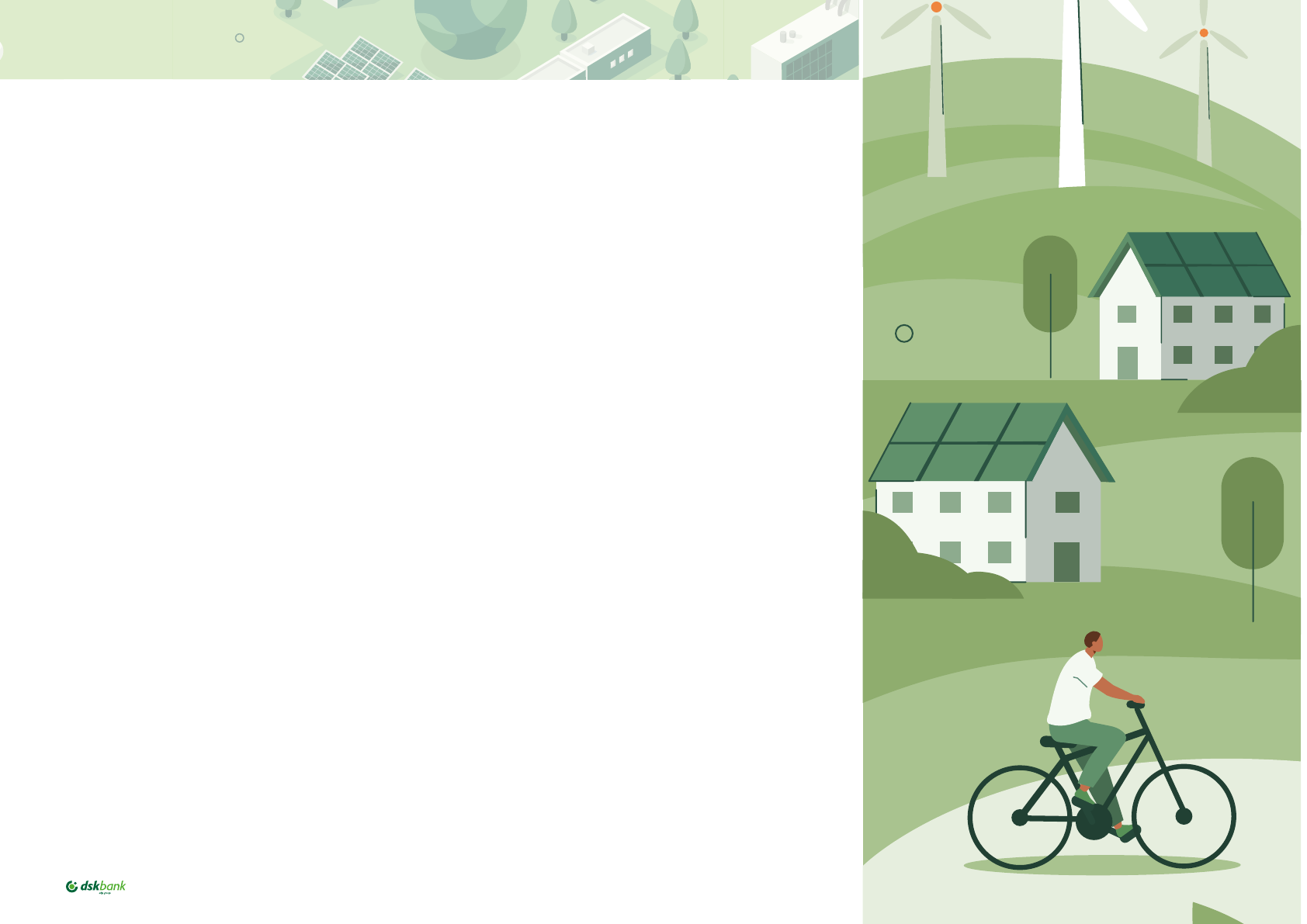
Client services in COVID-19 pandemic
The focus on the client is of key importance
for DSK Bank’s activity. That is why, in the last
two years, during the corona-virus pandemic,
the Bank continued its efforts to ensure more
flexible services and products according to the
clients’ individual needs, so that they can make
the right financial decisions in an extraordinary
situation. We reacted in fast and adequate
manner, in order to ensure the safety of our
clients. Special section was developed and
offered on the corporate website of the Bank,
as well as visual materials used by the clients
as to receive current information about the
procedures for safe servicing in the branches,
the possibilities for using remote services and
other useful information. During the periods
of active virus spread in the country, DSK Bank
provided safe access of customers to its offices,
recommended the use of a wide network of
machine channels - ATM, electronic banking
DSK Direct and mobile banking DSK Smart, as
well as cashless payments to merchants (incl.
Online). In order to avoid the concentration of a
large number of clients, DSK Bank continued to
promote the service among the clients for pre-
booking an appointment for a visit to the larger
offices.
In support of clients affected by the pandemic
mitigation measures in place, various options
were offered for deferral and settlement of
debts in order to ensure stability, calm and
security. In 2021, the clients of DSK Bank
continued to use options for deferral of loans
under the Procedure for deferral and settlement
of due liabilities to banks, in connection with
the state of emergency imposed on March 13,
2020. Also, DSK Bank extended the term and
proposed new additional deferral schemes,
which actually enabled its clients to use a
longer grace period, initially agreed under the
moratorium. Additionally, we have retained the
opportunity for our customers to use interest-
free loans under the Program for guaranteeing
interest-free loan for protecting people who
cannot exercise their occupational activities
due to the situation caused by COVID-19, on the
basis of agreement concluded with Bulgarian
Development Bank (BDB). DSK Bank has
supported also its business clients, small and
medium enterprises, by providing an option for
BDB guaranteed loans with an agreement for
portfolio guarantees in supporting the liquidity.
21
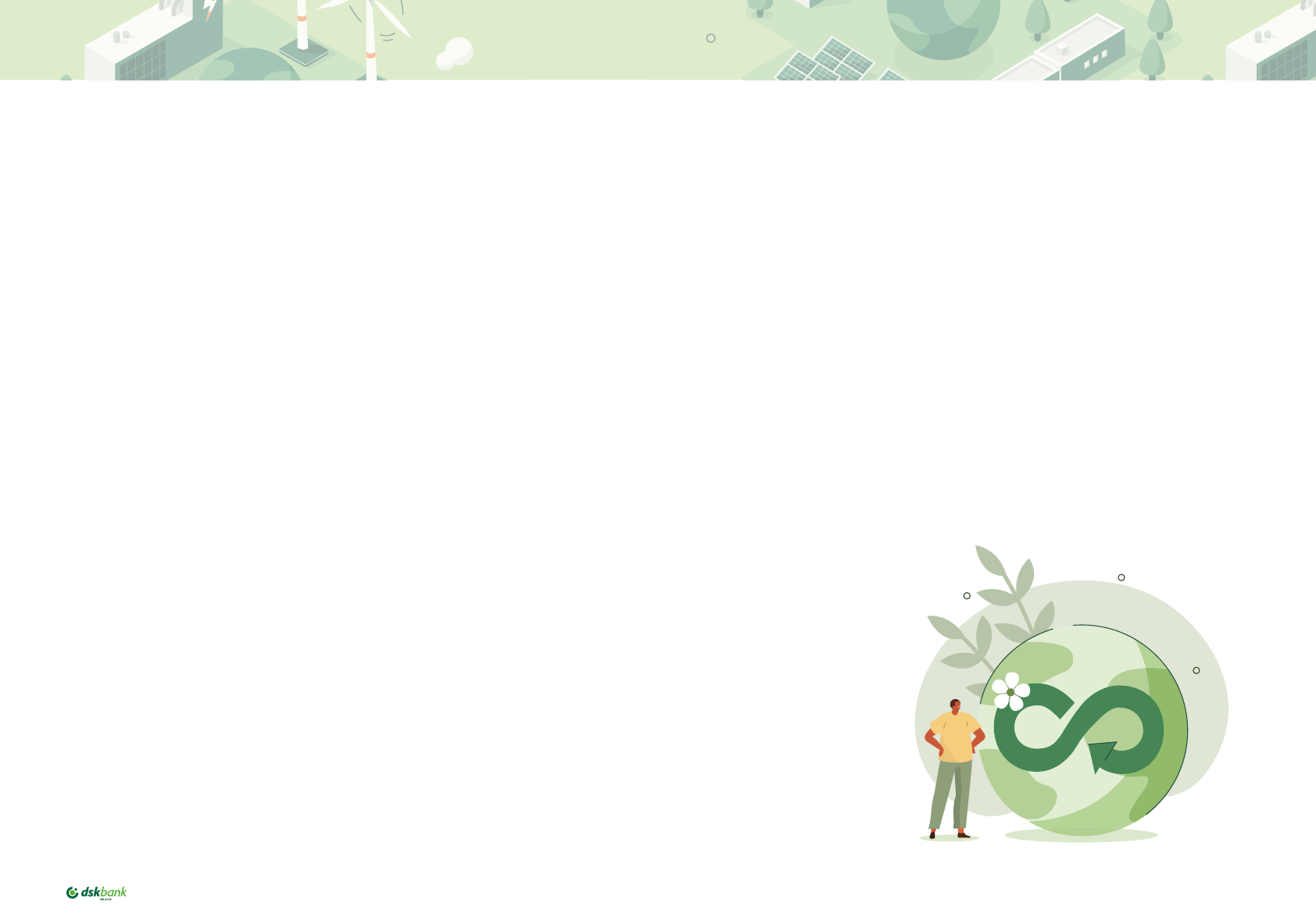
Following the trends of the recent years and
mainly the reorientation of a numerous part of
transactions to machine and electronic channels,
as well as based on the growing demands
of consumers to receive pre-contractual
information and advice on the financial products
and services that are most appropriate to them,
DSK Bank has started implementing New
Service Model in a whole branch network for
mass customers. The Model ensures specialized
customer service - those who visit the office only
for a payment transaction can rely on faster
service with significant decrease of waiting
time, while the customers who are interested in
banking product/service can rely on professional
and individual consultation and financial
advice from individual banking consultant. The
purpose of the New Service Model is to offer an
even better customer experience with the Bank,
improve the management of customer flow in the
branches and support employees in the process
of improving their confidence, upgrading their
skills and competence.
And last, but not least, for improving the client
services, DSK Bank performs regular research of
the financial services market, in order to discover
new opportunities and niches for improving the
services offered and to monitor the development
of the standard already adopted by the market
in regard to the client services.
Complaints handling
For every received complaint a comprehensive
check and analysis of the collected information
is performed. We use the complaints as an
opportunity for improving our services. When a
mistake on the part of the Bank is established,
measures are immediately undertaken by the
responsible units. The Management is regularly
informed about the established weaknesses
and problems. To improve the competence of
the employees, trainings and consultations
from the management teams in the regional
centers are organized. Each complaint reply
contains a contact phone number and e-mail
for connection with the complaints unit if
additional information is needed regarding the
answer provided.
Client satisfaction
Generally, DSK Bank has well established
traditions for measuring the satisfaction of
its banking clients. In 2020, DSK Bank has
implemented new metrics for measuring
customer experience that allows the client to
rate the services immediately after a visit to
the Bank office. This approach guarantees the
transparency and provides an opportunity for
immediate actions for improving the services
in every bank office. The Bank uses as a metric
the world leading indicator on customer
experience measurement – transactional Net
Promoter Score (NPS). Transactional NPS for
2021 has increased compared to 2020 and
remained stable throughout the year. This
result of transactional NPS which reached 72 in
December 2021, shows high service quality level
and positive experience that customers receive
in DSK Bank.
We continue to work for improving the client
services. In 2021, the Bank actively developed
its strategic initiative (New Service Vision),
aimed to ensure outstanding client services.
In 2022, a second phase of the initiative will
be implemented, focusing on improving DSK
Bank’s employees’ knowledge on the modern
project management methodologies (agile,
service design methodology, etc.) which aims
for DSK Bank to be one step further on its way
to digitalization.
22
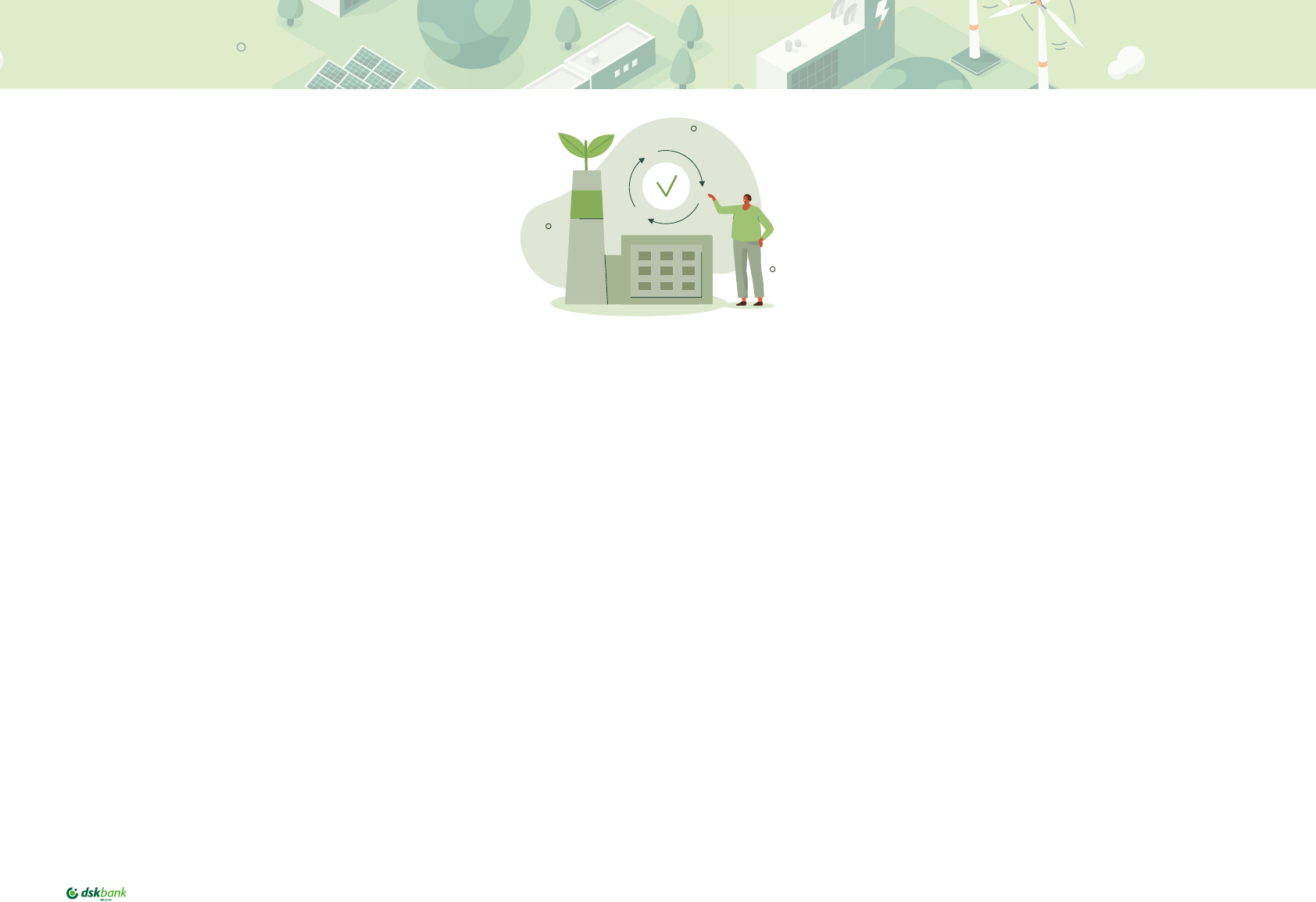
DSK Bank in its capacity of an employer
In DSK Bank we have a clear vision on our
employer brand: Everyone looks for employees,
we look for people! This means that our
employees are above all people of whom we
take care in the best possible way and help
them develop and reach their goals. In order to
support DSK Bank’s employer brand, a complete
Employee Value Proposition (EVP) was prepared
and communicated internally and externally.
It shows all of the non-financial aspects that
the Bank is offering to its employees. The EVP
is structured in 5 main areas: Flexible way of
working, Digital technologies, Health and well-
being, Learning and development and Culture.
They are available on the Bank’s corporate
website as well as in the internal learning
platform Moodle.
The Bank regularly participates in different
career forums, which is another connection
of the institution with young talents and
proven professionals. In addition, this regular
participation in such events keeps DSK
Bank’s relation with the universities and local
authorities at very good level. As a result, they
exchange know-how and cooperate in finding
the best students as a source for the Bank’s
internship program and recruitment in general.
In 2021, the first large-scale employee
engagement and satisfaction survey was held
for the entire OTP Group, with a high response
ratio of 92% at Group level and 92% as well
for DSK Bank. Based on the results, the rate of
employee engagement in DSK Bank was 67 %.
In response to the feedback, action plans were
prepared for all areas that need improvement.
On Bank level these are Communication and
collaboration, Recognition and Feedback
Culture, Better access to the right tools. The
respective action plans are either completed or
ongoing as planned.
RESPONSIBLE APPROACH TO EMPLOYEES
Healthy and safety at work
Contract with Occupational Health Service is in
place which provides full support of the needed
activities, assessment of the microclimat
conditions in the work space. Periodic
instruction on occupational health and safety is
performed to all employees at an annual basis
and compulsory for newly hired employees.
In 2021, the second year of the COVID-19
pandemic, we continued to protect the health
of our employees as much as possible. For
employees from all HQ units we continued to
apply the opportunity to work at home office,
incl. by schedule. Over and above the statutory
rules, we initiated an internal vaccination
campaign and provided vaccination to the
interested employees at the workplace as well
as individual consultations with specialists in
COVID-19 pandemic.
DSK Bank also ensures health support to its
employees through the Wellness Program
provided, sports card at preferential rate as well
as prophylactic examinations that were resumed
after an interruption due to the pandemic.
23

Diversity and inclusion
The DSK Bank’s mission as an employer is
to create a work environment in which its
employees have the opportunity to work in
a diverse, mutually supportive team and in
an inclusive work culture that allows them to
use their potential to the fullest. Diversity and
inclusion are essential for the implementation
of the corporate strategy. In March 2022, we
prepared and published on our website the
Diversity and Inclusion Policy of DSK Bank. The
Policy promotes diversity in management bodies
in order to attract a wide range of qualities
and competencies when recruiting members
of management bodies, to achieve diversity
of views and experiences, and to facilitate
independent opinions and reasonable decision-
making within the collective body aiming at
adequate gender representation and ensuring
that the principle of equal opportunities is
respected in the election of members of the
governing body.
The Bank commits itself to adhere to the
following principles:
Principle 1:
Diversity
In particular, the Bank is
committed to increase the
share of the under-represented
gender in the governance,
while fulfilling the legal
requirement that the members
of the management body have
adequate knowledge, skills
and experience. We set the
goal for 2023 at least two of the
members of the Management
Board and of the Supervisory
Board to be women.
Principle 2:
Equality
The Bank commits to ensure
that all employees are
provided equal opportunities
and conditions throughout
the life cycle of employees,
general working conditions,
or career development. Under
the Remuneration Policy of
DSK Bank, we consistently
apply the principle of “equal
pay for equal work”, including
by providing equal pay to
men and women for the same
position and performance.
Principle 3:
Inclusion
The Bank has zero tolerance
to all forms of harassment,
abuse and discrimination,
and is committed to create an
inclusive culture free of such
behavior.
Our employees’ interests are represented by their trade union - National Banking Syndicate, with the
Collective Agreement signed by DSK Bank, setting out the rights and obligations of every employee. As
of the end of 2021, the rate of the trade union members is 53%.
DSK Bank individual
basis employees (31 Dec)
2020 2021
Total Men Women Total Men Women
Employees, total 5302 1136 4166 5358 1159 4199
Distribution by gender 100% 21,43% 78,57% 100% 21,63% 78,37%
Turnover rate 16,18% 3,54% 12,64% 18,33% 3,58% 14,75%
24

Ethics Code and Anti-Corruption Policy
DSK Bank as part of OTP Group is committed
to the fight against corruption and states zero
tolerance to any kinds of bribery. The Bank has
adopted a Policy for corruption prevention,
where the principles of anti-corruption activity
are defined, as well as the main fields with risk
of corruption. The Policy applies for the entire
DSK Bank Group, incl. the subsidiaries. In the
course of and in connection with the DSK’s
activities, all staff members and any other
contractual partners of DSK Bank Group are
strictly prohibited from performing any act
of corruption and from participating or being
involved in corruption. The Bank consistently
and resolutely stands up against corruption.
In case of violation of the Policy by any person,
the Bank shall take all steps necessary to avert
potential negative consequences and to avoid
similar events in the future. DSK Bank ensures
the full enforcement of all Bulgarian, European
Union and international anti-corruption
regulations, and requires all of its staff members
and contractual partners to comply with such
regulations.
In addition, the Ethics Code of the Bank defines
clear principles and requirements for the
employees and the partners of the Bank, as
well as its affiliated companies, in relation
to the adherence to the ethical norms at
work. The main emphasis of the Ethics Code
includes the right of employees to participate
in the political or public life, ensuring safe and
healthy occupational environment, promotion
of mutual respect, prohibition of discrimination
and abuse, integrity in business relations,
zero tolerance to corruption and attempts to
influence, restrictions on offering and accepting
gifts above the specified value.
The Ethics Code of DSK Bank and the Anti-
Corruption Policy are publicly accessible on DSK
Bank official website.
Whistleblowing
A whistleblowing system operates within the
Bank to facilitate adequate identification and
handling of cases on potential misconduct and
unethical behavior, including discrimination.
In case of doubt or possible violation of the
norms of Ethics Code and Anti-Corruption
Policy, the employees are provided an option to
report it, including anonymously, to Regulatory
Compliance Department, which will undertake
the measures necessary as per the internal
rules.
Any request affecting human rights is treated by
the Bank as a priority.
RULES OF CONDUCT
Our employees’ professional and ethical conduct is one of the basic prerequisites for the company’s
successful development. We follow strong principles of behaviour that respect the human rights,
and do not support or tolerate any form of violation of the Bank’s rules of conduct.
25
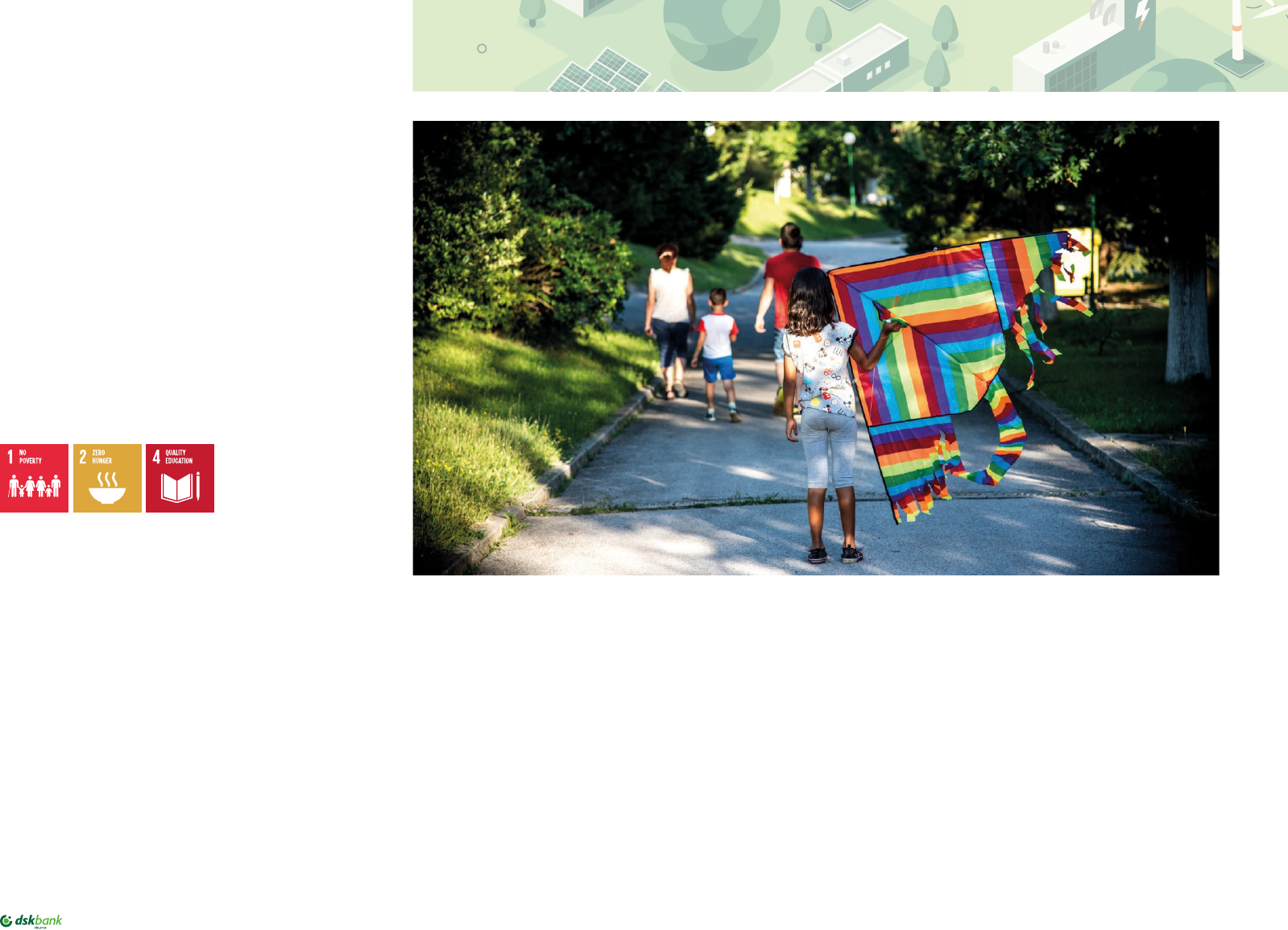
Early childhood development
Last year DSK Bank continued its successful
partnership with SOS Children’s Villages
Bulgaria - an organization for social
development that guarantees the right of
every child to have a family and grow up in an
environment full of love, respect and security.
The partnership dates back to 2011, when the
bank committed to constantly taking care of
two SOS families.
In 2021, we celebrated 10 years of partnership
under the title “10 years together”. We celebrated
the anniversary with several additional joint
initiatives. One of the children from the foster
family we look after was an intern at the bank
for 6 months. We also sent gifts to the children
for the beginning of the school year and June
1
st
. In October, we launched online lessons
on financial literacy and personal finance
management which were led by volunteers
from the Bank on Fridays, in the afternoons. The
training targets teenagers from the SOS Youth
Centers.
Our Chief Executive Officer, Mr. Tamas Hak-
Kovac, was awarded the special prize “10 years
together” by SOS Children’s Village, and the
bank was once again the largest corporate
donor and partner of the association.
In 2021, over BGN 600 000 were accumulated
as donations through the different banking
channels. Overall, BGN 4 506 000 were provided
to SOS Children’s Villages for the last 10 years,
thanks to the successful partnership.
SPONSORSHIP
AND CHARITY
26
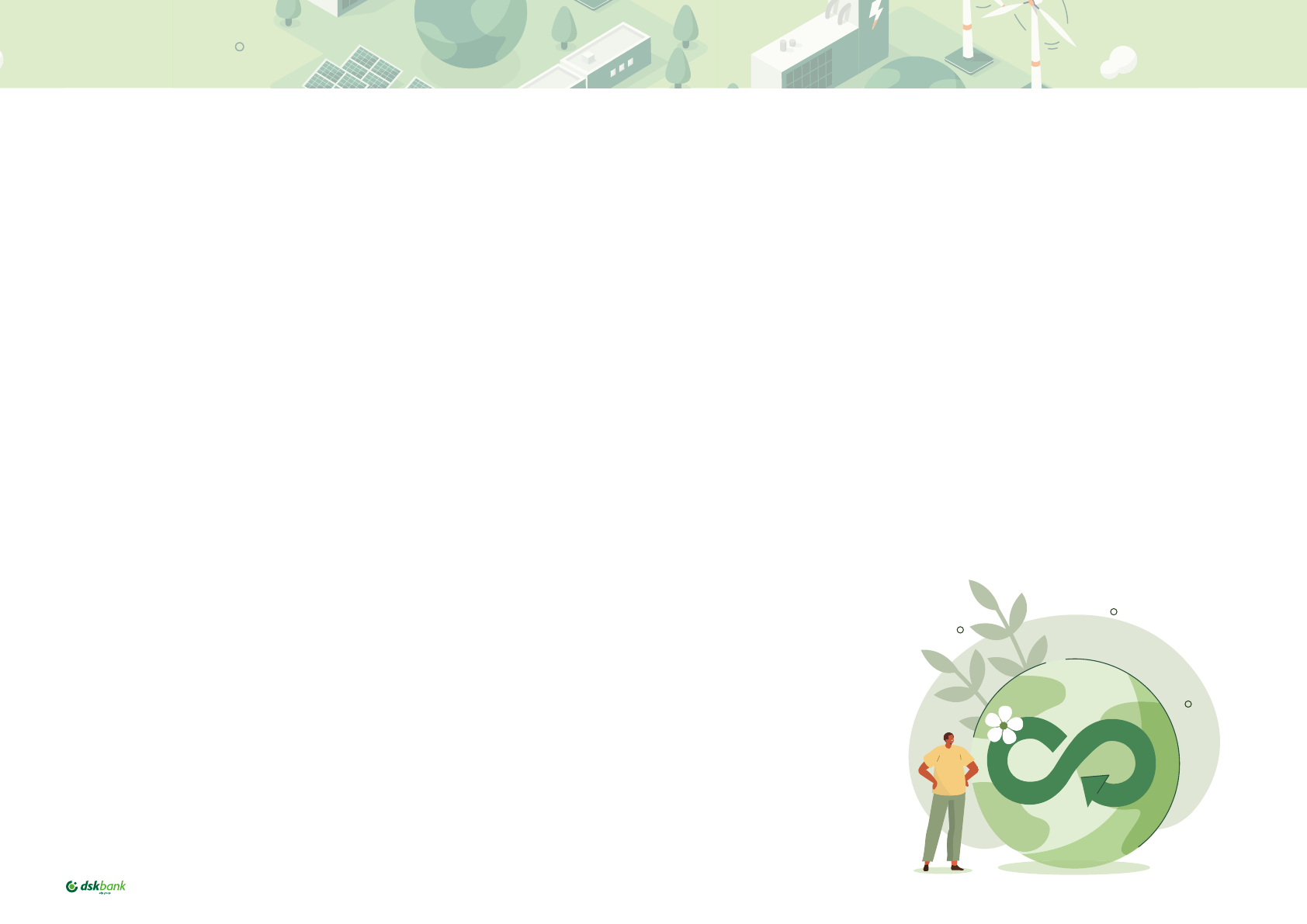
Charity events with the participation of
employees
In 2021, our employees participated in various
events which combined running and charity. On
19
th
September, the annual edition of the mini-
marathon with cause “Run2Gether” took place.
The initiative unites the efforts of people with
different abilities. By participating, the team of
DSK Bank gave its support to the disadvantaged
people.
In August 2021, 13 teams from the Bank took part
in the Business Run event. The event with cause
was held for the 8th time in a row. Each team
consists of 4 competitors and runs the distance
of 4 km. Traditionally, 30% of the event fees are
donated to charity.
In 2021, DSK Bank has also launched its own
Corporate Social Responsibility project for
improving the urban environment – the
campaign “City as its people”. The initiative
aims to help make Sofia a better place for living,
as well as draw attention to the problem of
vandalism and ugly inscriptions. The idea of the
campaign was to transform the scratched walls
of a location in the central part of the city, and
with the help of established Bulgarian graffiti
artists to turn them into a work of street art, the
so-called mural. The project was implemented
in three stages. During the first stage DSK Bank
challenged the residents and guests of Sofia to
send their proposal for a location or a building
that will undergo artistic transformation. At the
end of this stage, a place was chosen - one of
the walls in the subway on Bulgaria Blvd. and
Acad. Ivan Geshov”, which was transformed
with the help of graffiti artists from “140 Ideas”.
During the second stage of the campaign, the
artists, together with the help of the campaign
ambassadors transformed the chosen location.
The mural recreates in a beautiful and colorful
way the theme of continuity and tolerance
among the people in the city. This way, DSK Bank,
the artists and the ambassadors stood behind
the idea that there is a more beautiful way to
change the look of our capital than to have hate
speech on its walls. In the third stage the mural
was presented to all the residents and guests of
Sofia.
Other social projects supported
DSK Bank continues its partnership with the
BCause foundation, whose main goal is the
further development of the donation culture, it
implements policies in the field of sponsorship
and social investments, etc. In 2021, the Bank
provided a financial support for the foundation’s
campaign for collecting funds in favor of the
Fund supporting women – victims of domestic
abuse. The financial resources are directed to
the crisis centers providing services for women
and children, victims of domestic abuse.
27
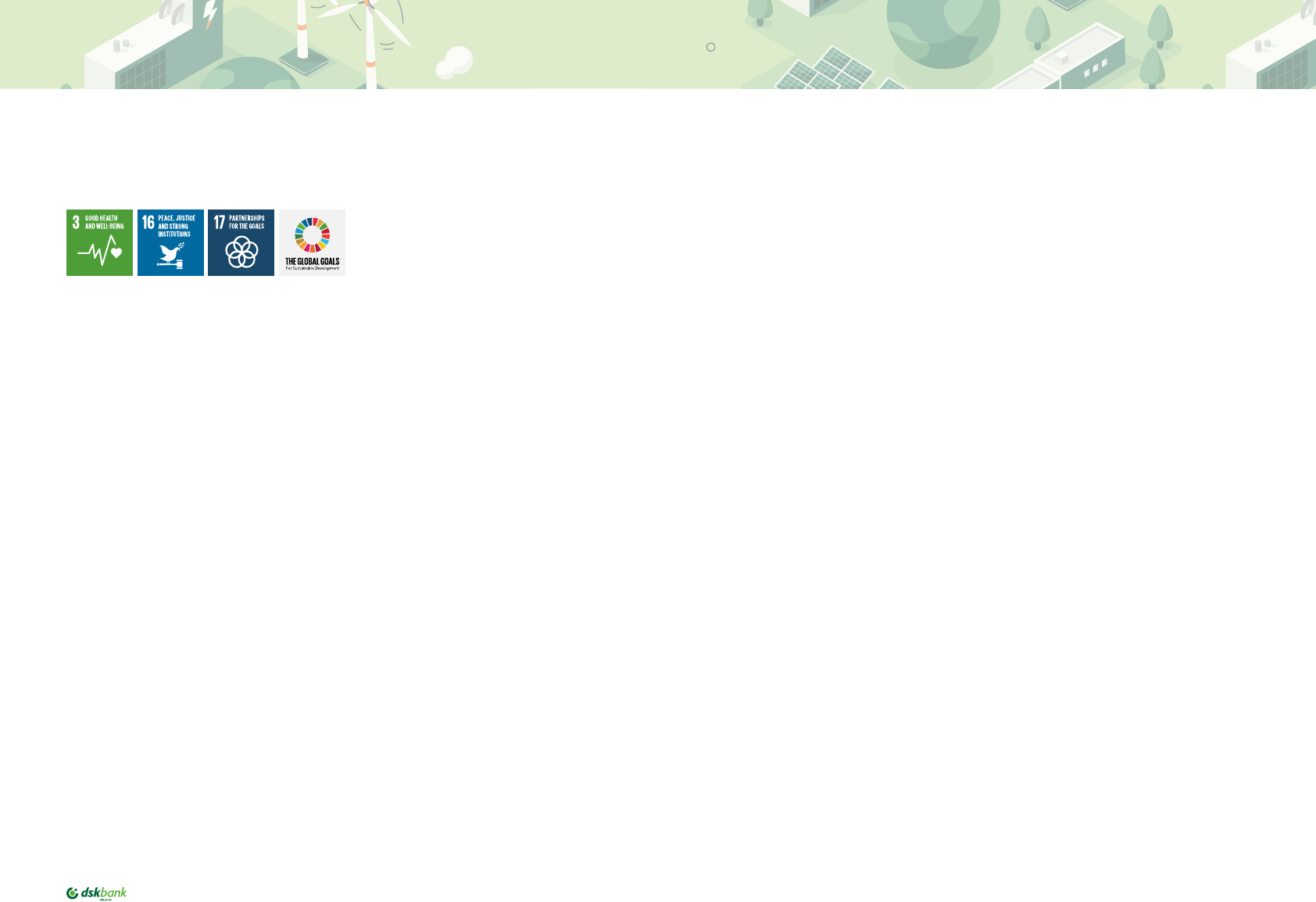
In February 2021, DSK Bank was awarded
first prize in the category of „Services” in the
prestigious advertising festival, distinguishing
the efficiency of marketing communications in
Bulgaria – Effie Bulgaria.
During the same month, our campaign “Everyone
is looking for employees, we’re looking for
people” won the prize of the best Employer
Branding Campaign awarded by B2B Media.
In May 2021, our financial literacy initiative
“Financial Olympics” won the prestigious 3rd
place in the Corporate Social Responsibility
Campaign category.
June 2021 was definitely the month of the
most awards in the Bank. At the awards of the
Bulgarian Association of Public Relations for
public relations, DSK Bank was the winner of 6
awards: for crisis communication, for employer
branding campaign, for digital campaign, as
well as two special awards.
During the same month, DSK Bank was
presented with its fifth award for Most Generous
and Significant Corporate Partner from SOS
Children’s Villages Bulgaria.
In July 2021, DSK Bank was awarded Best Bank of
the Year by the Bank Association in Bulgaria and
was distinguished in “Dynamics in development”
category.
During the same month, DSK Bank was
pronounced The Best Bank in Bulgaria for
2021, according to the specialized magazine
Euromoney.
In November 2021, Global Finance recognized
DSK Bank as the Best service supplier of foreign
exchange operations in Bulgaria.
In December the Executive Director of DSK Bank
and Chairman of the Management Board of the
Association of Banks in Bulgaria Mrs. Diana
Miteva, was awarded Banker of the Year for 2021.
At the beginning of 2022 DSK Bank CEO Mr.
Tamas Hak-Kovacs was awarded Team Lead of
the Year.
Our HR manager Radoslava Krosneva was
awarded HR Manager of the Year for 2021.
DSK Bank received the prestigious award
Business Honoris Causa for its long-term
support for SOS Children Village.
In April 2022 our campaign “City as its people”
was awarded in category PR Digital on IAB Mixx
Awards.
In May 2022 our new product in collaboration
with Mastercard – Mastercard Wildlife Impact
Card, won the Greenest Product Award in the
national competition The Greenest Companies
in Bulgaria 2022.
AWARDS
28
